Day of Baranja's Occupation Commemorated
ZAGREB, Aug 23, 2020 - The Osijek branch of the Croatian Association of Returnees (ZPH) on Sunday commemorated August 23, the day of the Great Serbian aggression, occupation of the Baranja region and the expulsion of the non-Serb population.
Branko Pek, president of the ZPH Osijek branch, said that after the Yugoslav People's Army (JNA) Novi Sad Corps on 3 July 1991 crossed into Baranja over the bridge at Batina, local extremists started intimidating local residents, which culminated on August 22-23, when local Serbs, with the help of the JNA, expelled all non-Serb residents towards Osijek and Hungary.
"Those who would not leave, mostly the elderly, paid for it dearly. The occupying forces used them as slaves for the most difficult kinds of work, and more than 200 people were killed during the occupation from 1991 to 1998, when the peaceful reintegration of the Danube region was completed," Pek said.
He said that Baranja had been under the protection of UN peace keeping forces since 1992 and that they, too, were resposible to some extent for the crimes committed against civilians as they did not do anyhting to prevent them.
"Those who ordered and committed crimes against innocent civilians are well-known to the authorities, some continue to move freely in the area, and nobody has been called to account for the crimes committed. We expect a just punishment for them," said Pek.
For the latest travel info, bookmark our main travel info article, which is updated daily.
Read the Croatian Travel Update in your language - now available in 24 languages
Environmentally Conscious Living in Baranja - Popovac Eco School
June the 9th, 2020 - Popovac is a small village located under the only small hill in Baranja called Banovo brdo, nestled away in the north east of the country, between Osijek and the nearby Hungarian border. Popovac's small village school is not your average school, however...
Beautiful nature surrounds the area, the view of the green fields and dense forests is spectacular. It isn't something unusual to have the feeling that you need to protect nature when you see the beauty of Baranja.
Popovac is a place with one school, one shop, one post office but one big ecological soul. The Popovac primary school boasts the diamant status for participating in an International eco-schools programme. Our school made a note that the environment and eco-living is a very important part of school life where the students can learn new skills and ways to make the environment around them better and save the nature we're so lucky to have for the future.
Through many years of experience, the Popovac primary school made a lot of progress and included the local community in learning and becoming more aware of the basic environmental needs which can improve the lives of every single person living in the village of Popovac.
But, just what are eco-schools? International eco-schools is a programme designed to implement environmental education guidelines throughout educational institutions (primary and secondary schools, kindergartens and boarding schools, special needs schools and even colleges), and the National Coordinator of the Ecological School in the Republic of Croatia is the Lijepa naša Association.
The International eco-school programme was developed by the Foundation for Environmental Education (FEE) in response to the 1992 UN Conference. The programmew was officially launched back in 1994 in several European countries, including Denmark, Germany, Greece and the United Kingdom. Today, eco-schools are conducted in more than 64 countries around the world, connecting as many as 49,000 schools.
At the beginning of every school year, all of us at school think about ecological ideas for most of the school's subjects that we can implement into the curriculum. Through all these years, we managed to develop a lot. From day-long school projects to monthly and year projects, the idea spread further, getting involved in projects on the scale of Erasmus+ projects. The Popovac primary school's praiseworthy project is called ''Kids against plastic pollution''.
The programme is designed to present our ecological ideas to partner schools in Norway, Turkey and Romania. At the meetings, we presented our eco-school in beautiful Baranja, and we're very proud of being the only one with the status of eco-school. Now, in the distance learning era, we continue to be active virtually. We're not physically at the school, but the students made a short video from home about plastic pollution which included their own ecological messages.
This experience of needing to stay at home and stay safe made the students realise what they have learned through their activities at school and what they can do at home too. They are now aware of the amount of plastic that their family uses and could talk about how to reduce that problem. On a monthly basis, students of the Popovac primary school are continuing to collect plastic bottle lids and are in the national project to help purchase expensive medicine.
Every school teacher can be proud of the results that the younger generations achieve thanks to the environmental education presented to them in their school classrooms. They are aware that young generations are sensitive to environmental issues and by being active in that field, they promote environmental concern as a value and as a of life.
For the next school year, new goals will be set and the importance of protecting our environment will be presented to yet another new generation of children who will be the bearers of responsibility for the school and the wider local community. Local government representatives are also included into our actions and are supporting the school's ideas which are pushed by proactive young people who are going to live eco-friendly lives and think of the
future, and not only of themselves.
Text by Marijana Kuna
For more, follow Total Eco Croatia.
SDP Chief: After Election Victory, Ten-Year Revitalisation of Slavonia and Baranja
ZAGREB, May 20, 2020 - Social Democratic Party leader Davor Bernardic said on Wednesday that after the election victory of the SDP-led coalition, ten years of revitalizing Slavonia and Baranja would ensue.
"The people here do not deserve to live in poverty. Our task, through the Slavonia 2030 program is to revitalize Slavonia and Baranja in ten years, to increase agricultural productivity twofold, to ensure subsidies for the smallest. To ensure so that they can place their goods and not be racketeered by retail chains and to boost industry," Bernardic said in Vukovar during his election trail.
To show that that is possible, Bernardic pointed out the example of Nova Gradiska Mayor, Vinko Grgic of the SDP who, as he said, had provided the town with investments valued at HRK 2.5 billion.
"Nova Gradiska is becoming a leader in Slavonia and people elected Grgic not because he is good looking and capable but because they decided to vote for themselves," Bernardic underlined.
Popovac on Tour: Baranja School Fighting Plastic Pollution in Turkey
Students from Popovac Primary School have just returned from a week in Manavgat, a town in the south of Turkey, where they participated in the third of four mobilities of the Erasmus+ project „Kids Against Plastic Pollution“.
On January 12th, 2020, Dorian Hranić, Dora Knez, Mateo Koprivec, Ema Rudnički, Leonora Vereš and Patrik Štainer, accompanied by teachers Goran Podunavc and Suzana Vencl, arrived in sun-kissed Antalya to continue their fight against plastic pollution with new friends from Turkey, Norway and Romania.
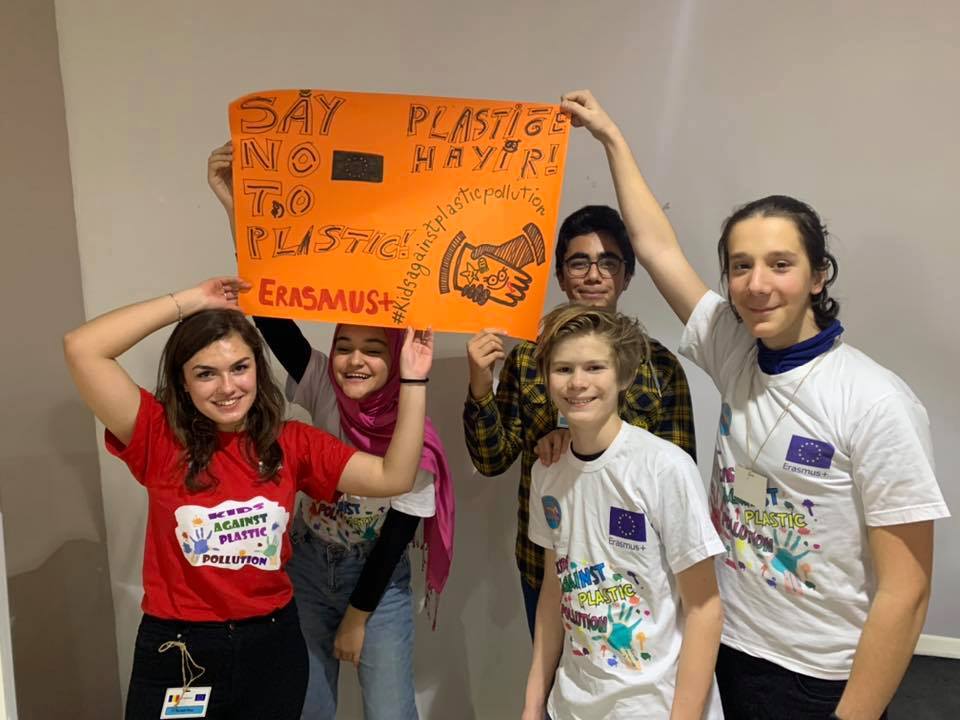
The host organizers prepared a program full of interesting activities. First, students learned how to make a successful campaign against plastic pollution. In international groups, they then made posters which they used to attract the attention of passengers during the beach cleaning later in the with. Using their own examples, the students showed that each change starts within each of us. The students also heard from the governor of Manavgat, who spoke about what the town does when it comes to the problem of plastic pollution.
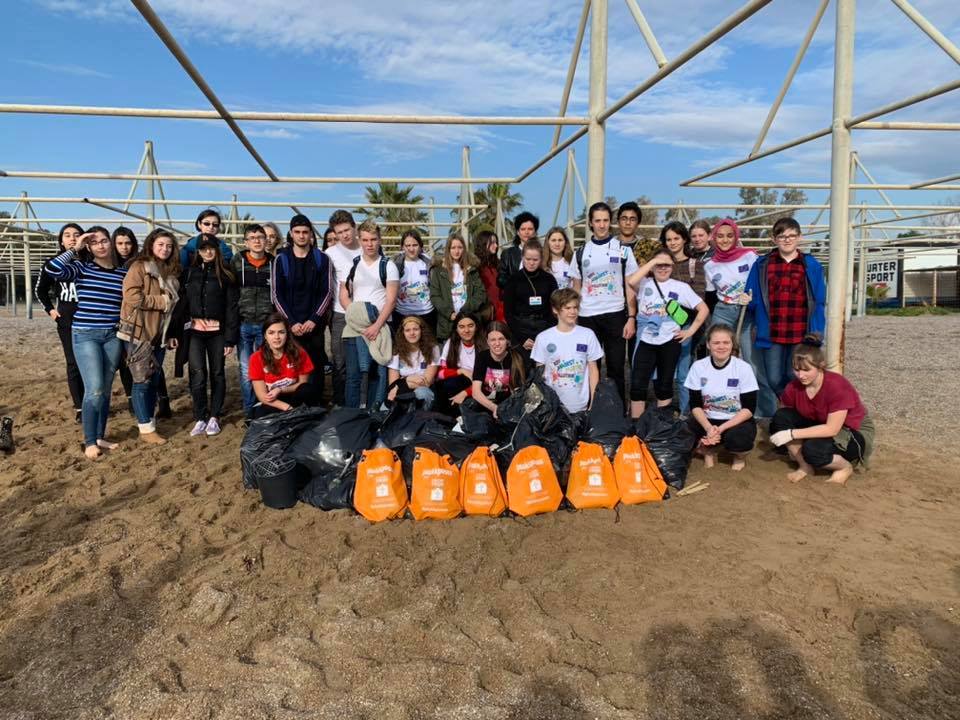
With slogans and drawings on posters, the students pointed on the problem of plastic pollution and on the need for action from all of us when it comes to saving nature. During a visit to one of the wastewater treatment plants in the town, they heard shocking facts regarding the most common plastic objects that wind up in the sewage. During the summer the population of 300 hundred citizens in Manavgat grows to one million. Irresponsible guests are the ones who mostly throw wet towels in toilets and since they are non-degradable they also wind up in seas and oceans.
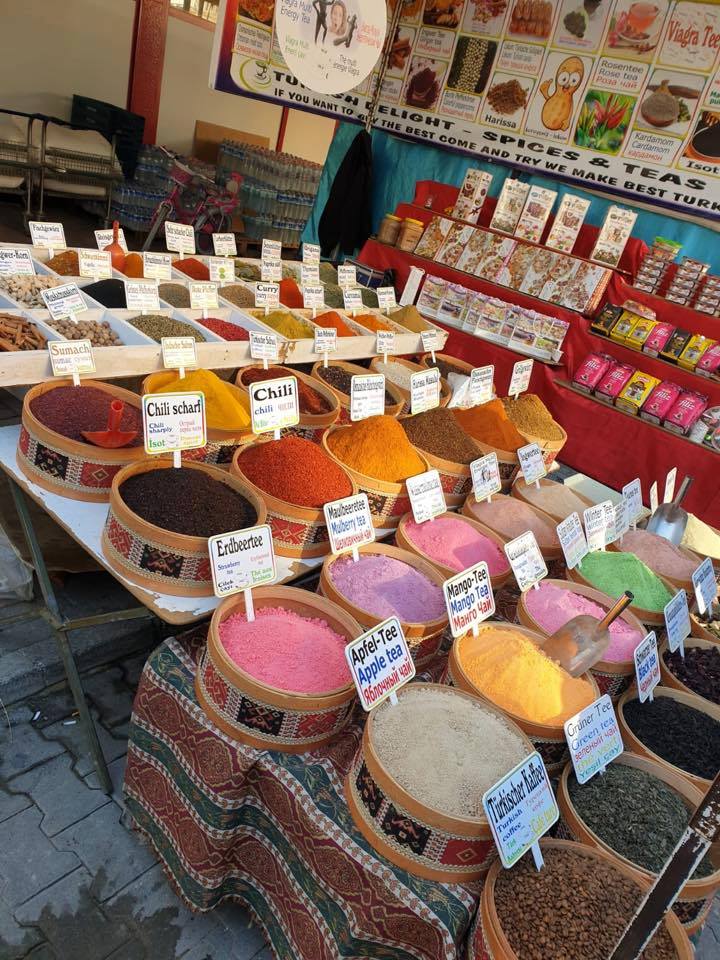
Workshops and lectures, also as quizzes, made the participant even more aware of the currently huge problem of plastic pollution and inspired the students to continue with the wave of positive changes in their local communities, as well as worldwide, by using the power of the Internet and social media.
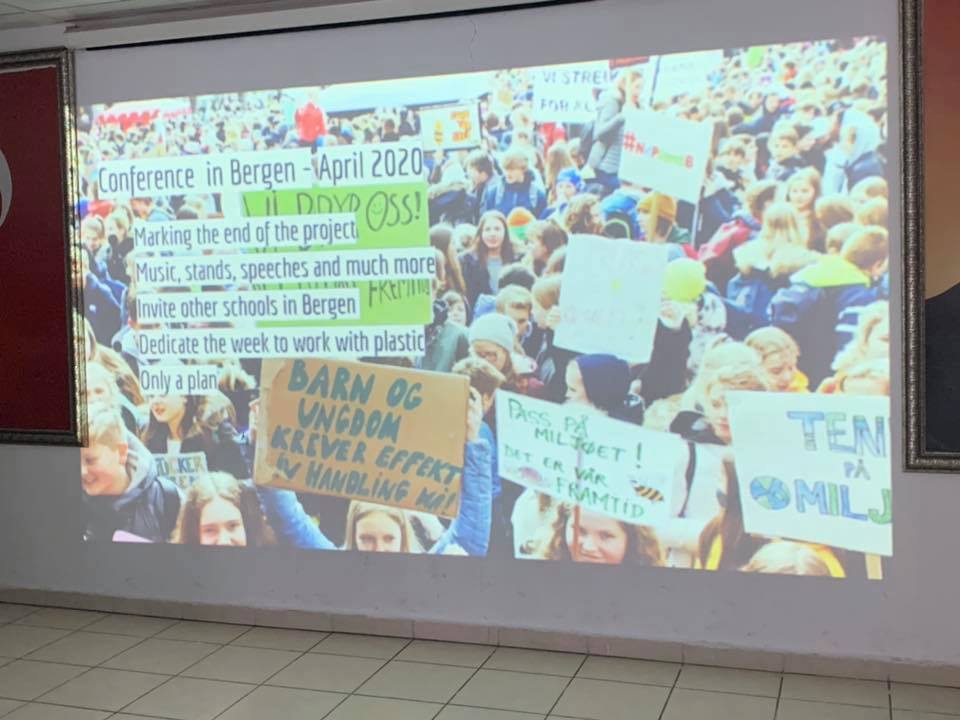
Also, there was time for visiting a mosque with four towers in Manavgat, exploring the ancient port city Side (2nd-century Antique Theater, Apollon Temple, museum) and a boat ride. In addition to the activities related to plastic pollution, the days were filled with culture and nature sightseeing which left no one indifferent.
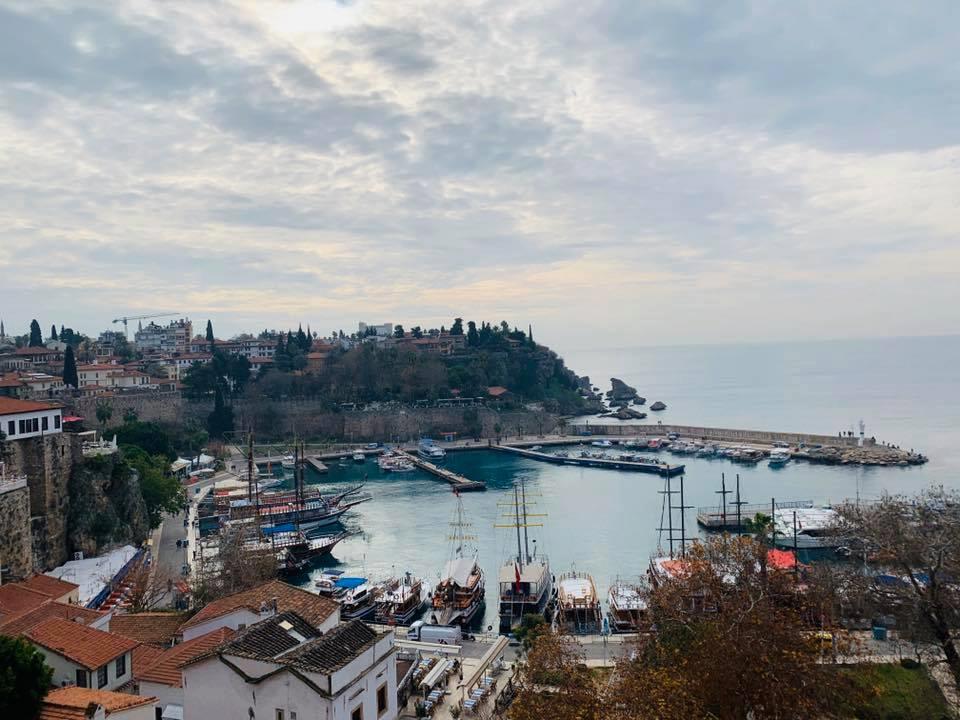
A day before going home, the delegation visited Antalya, which is often called one of the most beautiful cities on the Turkish riviera. The participants walked through the old city and enjoyed the streets full of restaurants, souvenir shops and small hotels, which are situated in the old houses previously used as residences. During the visit to Mevlevihane museum, the students learned that the origin of the spinning ritual (also called sema) is attributed to a widely revered holy man called Rumi, who preached inclusivity, tolerance, love and respect for all, regardless of their religion. The trip finished in a magical way, as the delegation saw the end of Düden Falls which drops off a rocky cliff directly into the Mediterranean Sea.
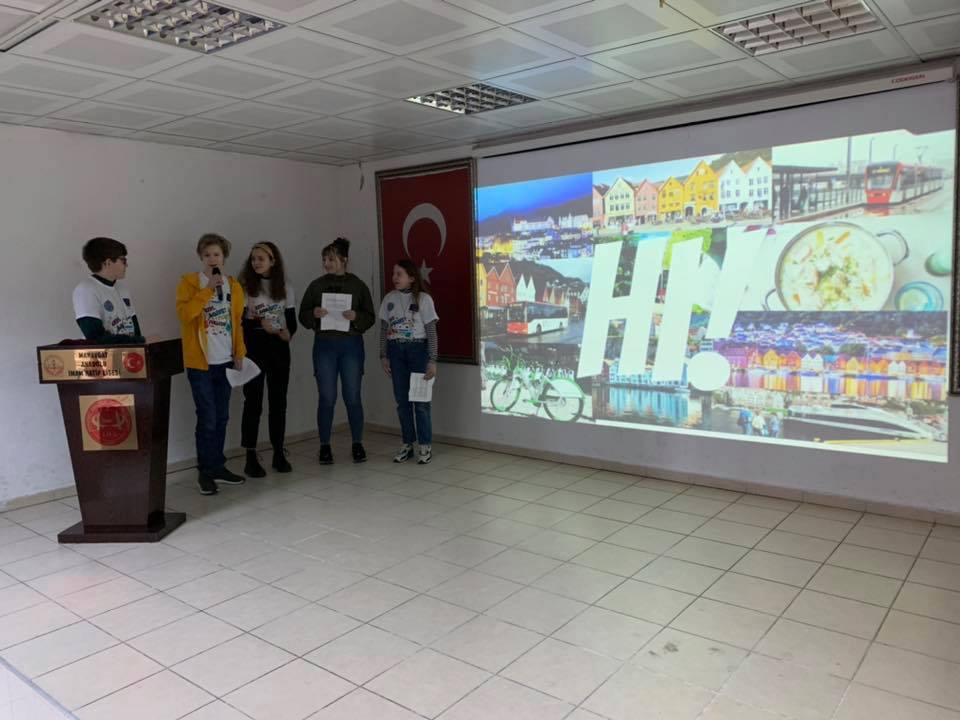
The students did not only get to experience their first flight by plane, but also got to live with Turkish host families. The students got to meet the Turkish way of life first hand, including their customs, but also felt their huge hospitality.
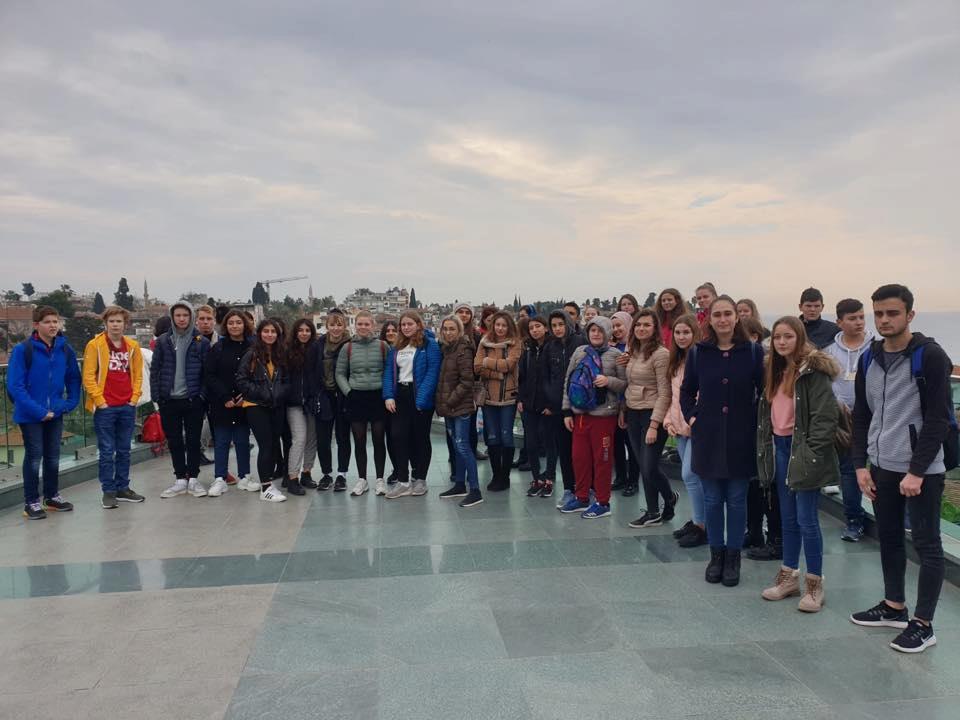
„Since I live in a Christian family, for the first time I saw how it is to live with Muslims and I had the chance to see their way of life. In the house of the boy Erdem I felt very comfortable, and his parents gave the Norweigan boy Vegard and me a warm place to stay,“ said fifth-grade Croatian student, Dorian. He added: „Also, I learned how many years are needed to degrade some plastic products and what each of us can do for a better world without plastic. By learning and having fun with new friends, also I managed to fall in love.“
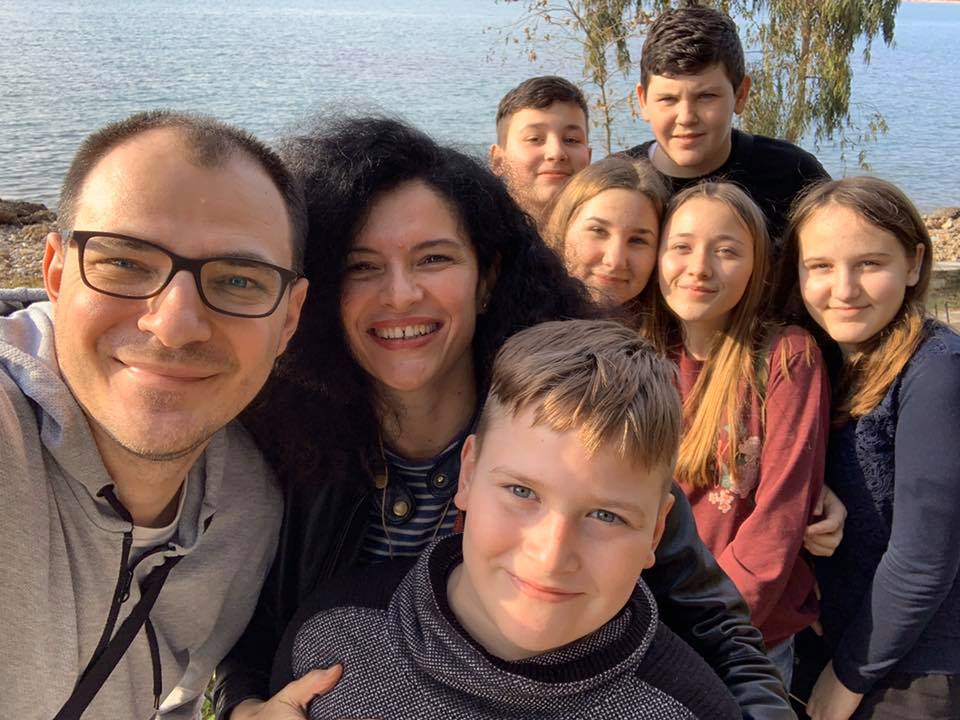
"Being in Turkey with this project was a wonderful experience. We were received with kindness and warmth by our host families, who showed us nothing but hospitality and love. It was a very eye-opening experience, since we visited a water plant where plastic is gathered so that it doesn't end up in the sea. And the figures were shocking: around 3 tonnes of plastic end up daily at the plant, only from the hotels' area. We also drew posters and cleaned up the beach in Manavgat, in order to get a little bit closer to our goal and be an example for the locals. But while dealing with plastic related issues, we also found time to have a great deal of fun. We visited ancient ruins, went on a boat trip, played games, learned traditional dances and let's not forget one of the most important parts: We loved Turkish food," said 16-year-old Romanian student Ana-Maria Avram.
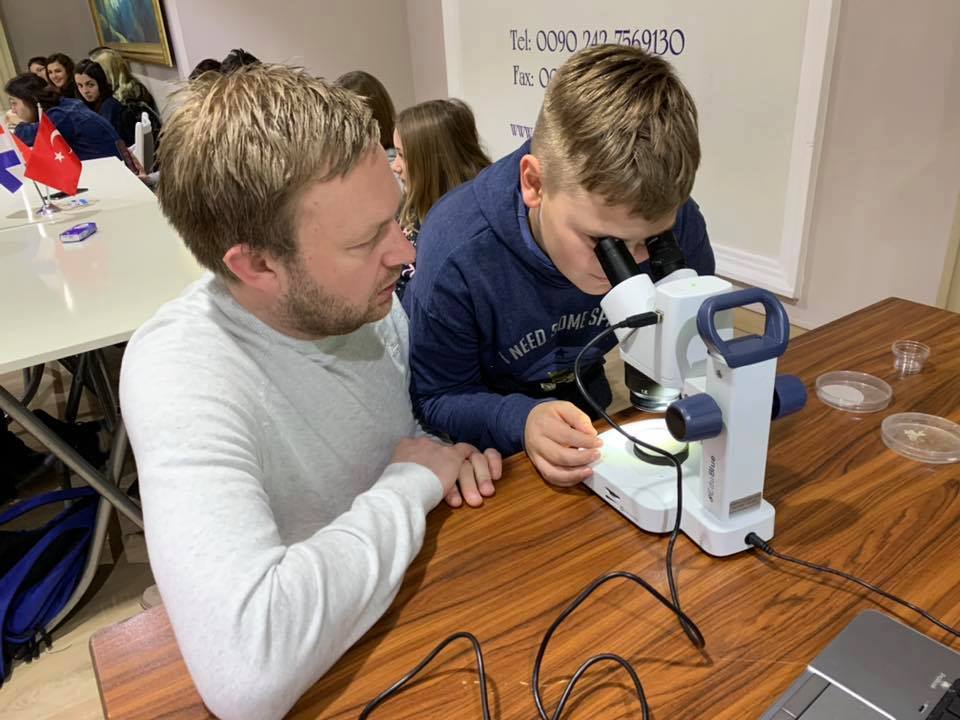
„I feel sorry for everyone not being here to experience what we have been through“, said the 15-year-old Norwegian student Anna Bakke. She could not stop talking about her fantastic host-family who took her with them to visit their whole family, showing her Turkish customs and giving her the experience of a lifetime. Throughout the week, she and the other students from Bergen, had through the different activities learned more in a week than most pupils do during a whole school year. About culture, plastic-pollution and how we can prevent it, in addition to getting new friends and learning something about themselves.

Since the way back home was long enough, there was plenty of time for making new plans for the upcoming mobility in Bergen and Odda, with the main accent on a very important conference where some of the results of the project will be presented.
The Croatian students came back to Baranja on the 18th of January 2020, and their satisfaction suggests that the program of this mobility was quite a success.
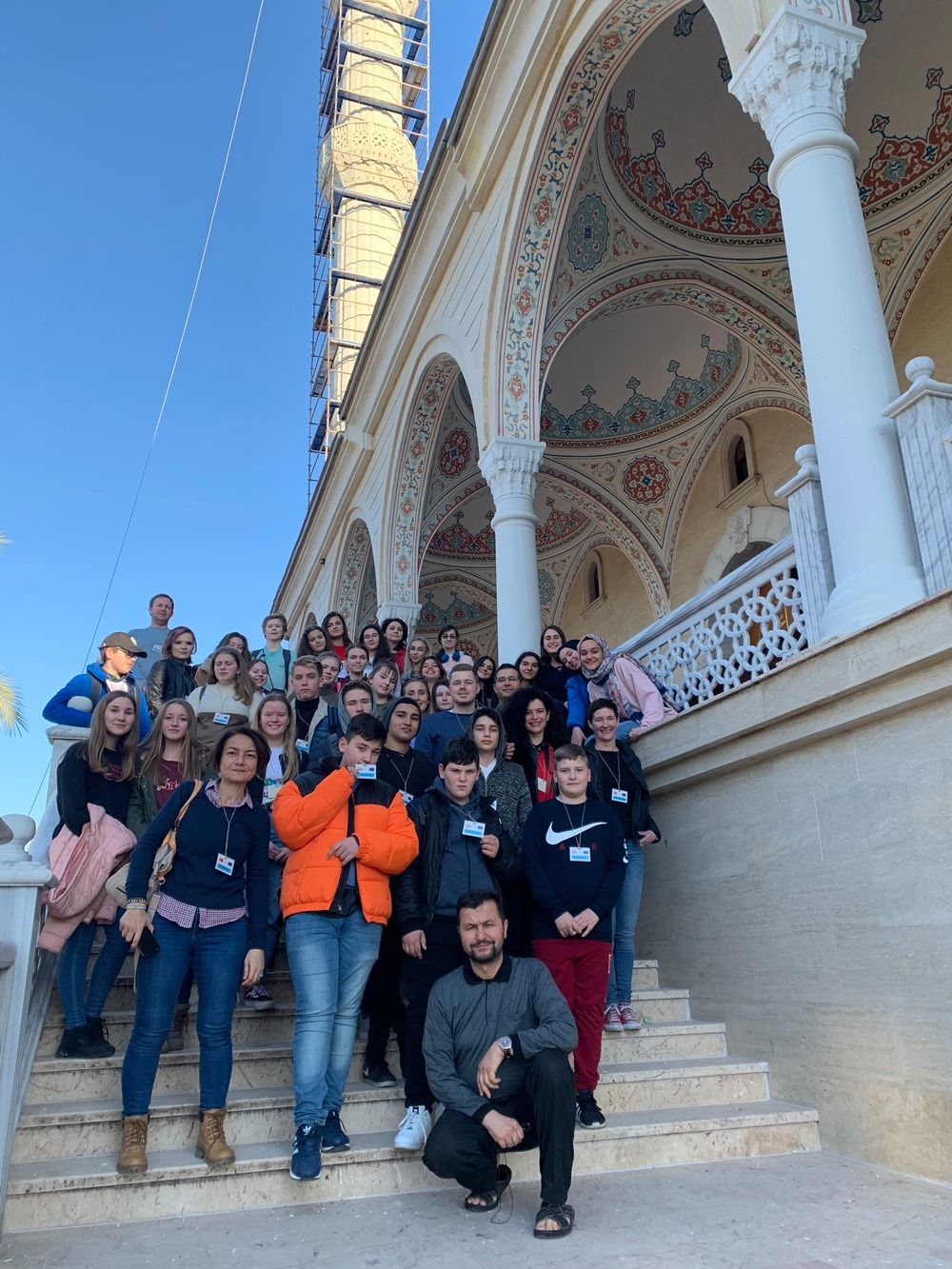
All the project activities, which are financially supported by the Agency for mobility and European union programme, can be followed on the official Facebook and Instagram page „Kids Against Plastic Pollution“.
You can follow the latest from Popovac school on Facebook.
Baranja Students Send Letter to President Grabar-Kitarovic: She Replies
October 18, 2019 - Croatian President Kolinda Grabar-Kitarović has replied to an Erasmus+ team of students from Primary school Popovac, encouraging them to continue their activities with their friends from Norway, Turkey and Romania against plastic pollution.
The students from Baranja wrote a letter in which they wanted to hear her thoughts about problems related to using too much plastic in our everyday lives and asked her to talk more in public speeches about that huge problem.
Also, they invited her to join them at the conference next April in the Norwegian city of Bergen, where they will meet with other students from European school to discuss plastic pollution.
In her reply, the President wrote that she is happy to know that each day more and more young people in Croatia are aware of the importance of taking care of the environment. She added that during her recent visit to New York, she spoke at the UN General Assembly about the topic of environmental pollution, especially of the sea in which people throw away a lot of different trash. To world leaders she mentioned the good example of the Croatian island Zlarin.
Their 300 local citizens made huge and very important changes in the fight against plastic pollution.
„I'm satisfied that our President is aware that plastic pollution in our rivers, seas and oceans is one of the biggest threats that humans are fighting against. I never thought that someone so important would reply to us students from such a small school,“ said eighth-grade student Lucija.
„It's a little bit sad that our President can't travel with us to Norway. It would be so cool to meet her. Her reply is another motivation for us to keep participating in all activities as part of this important project in which each of us with our hearts and way of thinking dedicates time to taking care of our environment,“ added sixth-grade student Ivano.
The President's letter made many students very happy. They gathered in the school's library where they read it a few times with disbelief. They decided to put this letter into a frame. Other students from Norway, Turkey and Romania are also eagerly awaiting the next mobility where students from Baranja will proudly show the letter and translate all the encouraging words from the Croatian president.
Popovac Primary School, a Creative Beacon of Hope in Baranja
October 9, 2019 - It is tucked away (very neatly) in an almost forgotten part of eastern Croatia, but Popovac Primary School in Baranja is a truly remarkable institution.
One of the things I love most about running Total Croatia News is the randomness of my inbox. Yes, there is lots of abuse from people who object to an article or two that I write (but I am learning to accept and appreciate the abuse as the years go by), but people from all walks of life and all over Croatia (and beyond) contact me for a number of Croatia-related reasons.
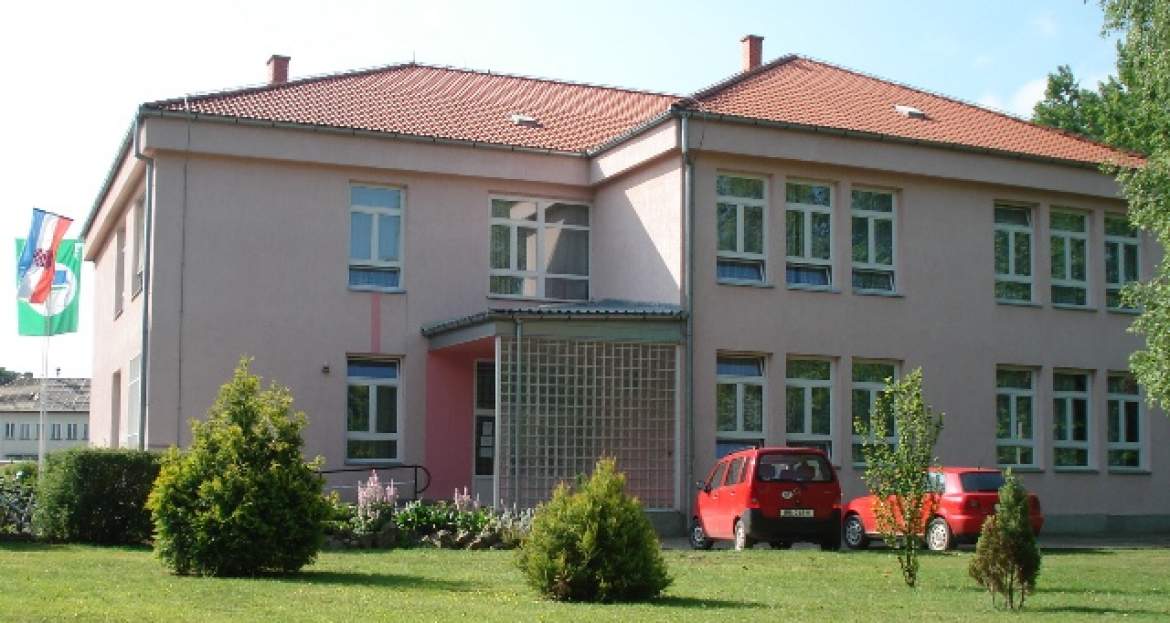
One of my favourite of such emails came from Goran in Baranja a couple of years ago. He wanted to volunteer his writing services so that he could present stories about the lovely region of Baranja, north of Osijek and on the border with Hungary. Goran explained that he was a teacher in primary schools, including Popovac, and it did not take long reading his email to understand how passionate he was about his job, or how much he wanted the best for his pupils:
The Internet connection was much slower in villages than in cities when I started work, but it didn't stop my students from winning an award for the best school website by CarNet (Croatian Academic and Research Network), nor did it stop them from participating in many projects that even brought them to the European parliament in 2009! We are a small school, but with all the activities and projects we have, we're the soul of our village. There aren't many activities out of school for kids and when you offer them something interesting to participate in, they are very motivated and always give their all.
A Baranja school in the European Parliament! And it was indeed true, as Glas Slavonije reported in 2009 (there is a translation below - thanks Lauren).
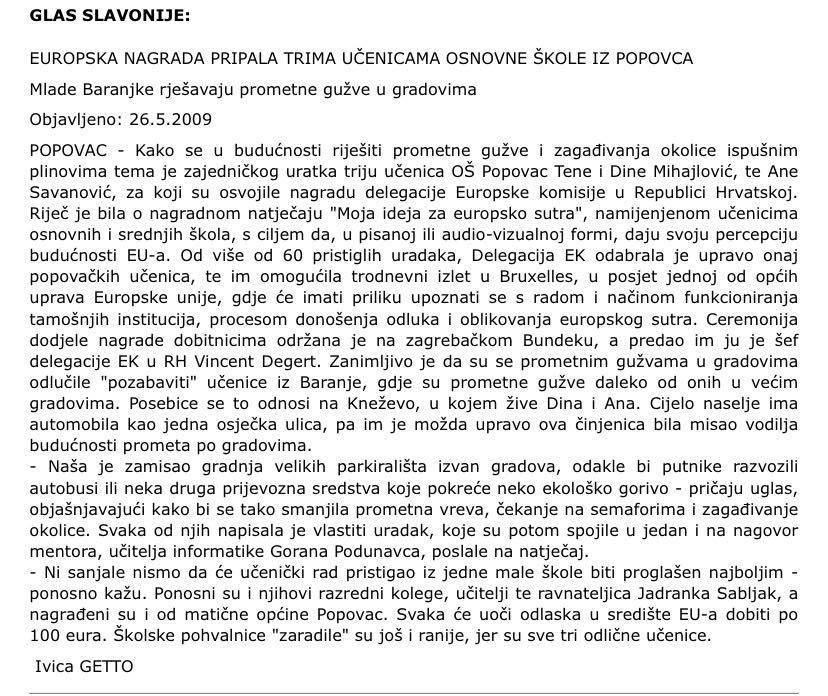
Popovac - How to deal with traffic jams and pollution in the future is the topic of a joint discussion between the three students of OS Popovac, Dina Mihajlovic and Ana Savanovic, for which they won an award from the EC Delegation in the Republic of Croatia. Popovac - How to deal with traffic jams and pollution in the future is the topic of a joint discussion between the three students of OS Popovac, Dina Mihajlovic and Ana Savanovic, for which they won an award from the EC Delegation in the Republic of Croatia.
This was the "My Idea for a European Tomorrow" prize competition, aimed at primary and secondary school students, with the aim of giving their perception of the future of the EU in written or audio-visual form. Out of more than 60 entries, the EC Delegation selected the idea of the Popovac students and awarded them with a three-day trip to Brussels to visit one of the general institutions there, involved in the decision-making process and shaping the European tomorrow.
The award ceremony was held at Zagreb's Bundek and the award was handed to them by the Head of the EC Delegation to the Republic of Croatia, Vincent Degert. It is interesting that when looking at traffic jams in cities, they have decided to seek an ''address'' from students from Baranja, where the traffic jams are far from those in larger cities.
This is especially true of Knezevo, where Dina and Ana live. The whole place has as many cars as one street in Osijek has, so perhaps that fact was the thought process guiding the future of traffic in cities project.
''Our idea is to build large out-of-town parking lots, from which buses or other vehicles powered by environmentally friendly fuel can transport people'' - they state, explaining how this would reduce traffic noise, waiting at traffic lights and pollution in the surrounding area. Each of them wrote their own piece of work, which they then combined into one and at the encouragment of their mentor, computer science teacher Goran Podunavac, they sent it to the competition.
I never dreamed that students' work from a small school would be proclaimed the best - they say proudly. Their classmates, teachers and headmaster Jadranka Sabljak are also proud, and have been honoured by their home municipality of Popovac.
They will receive 100 euros each before leaving for the centre of the EU. These school honours have been "earned" even earlier, as all three are excellent students.
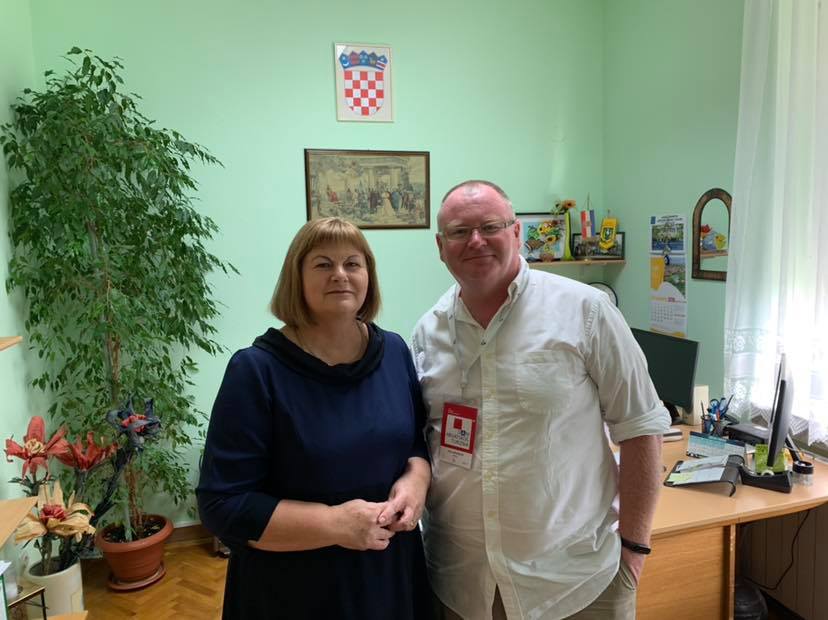
Goran started writing a few stories for us, and when he told me that Popovac Primary School also had a project for young web journalists, I suggested that some might like to write something for TCN, which they did, including one memorable account of what it is like to be the only pupil in the class. You can see the articles from Goran and the kids here. Popovac had also won the title one year of best school website in Croatia and it has been an eco school since 2002. I knew I had to visit.
An opportunity arose last week when I headed east for Days of Croatian Tourism in Slavonia, and Goran kindly arranged a tour of the school and Popovac, including a meeting with headmistress, Jadranka Sabljak. It was great to catch up with Jadranka and hear her vision - she has been at the school for no less than 35 years. Now that would be a great interview.
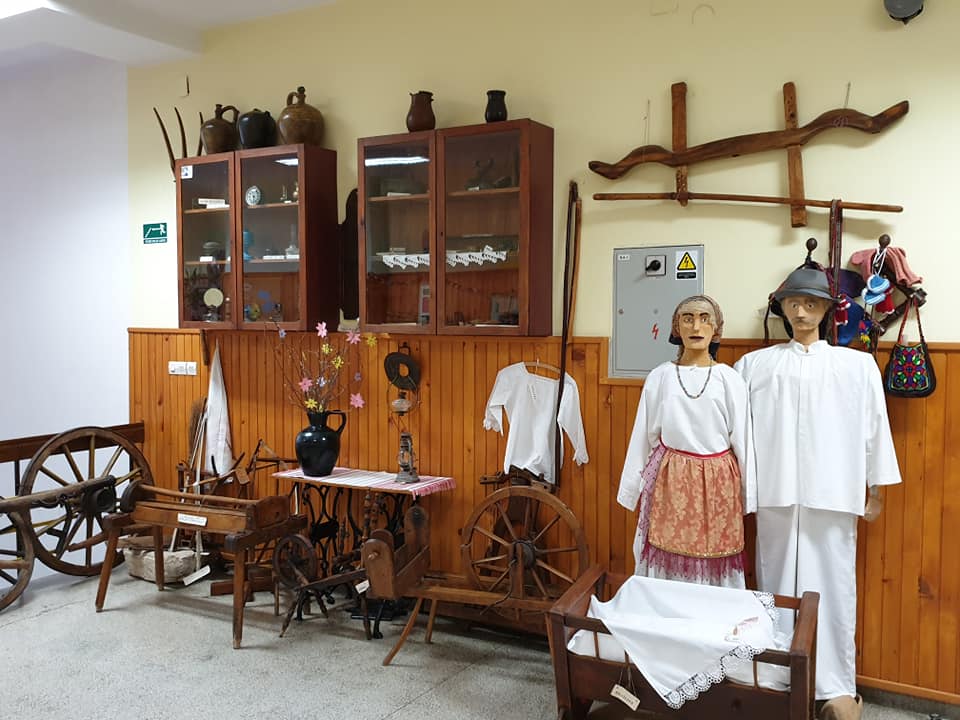
Popovac might be as far from the centre of Croatia as it is possible to be, but rarely have I seen such a lively, loved and creative public institution, whose staff clearly care deeply both about the school and the welfare of its pupils. And its traditions and heritage.
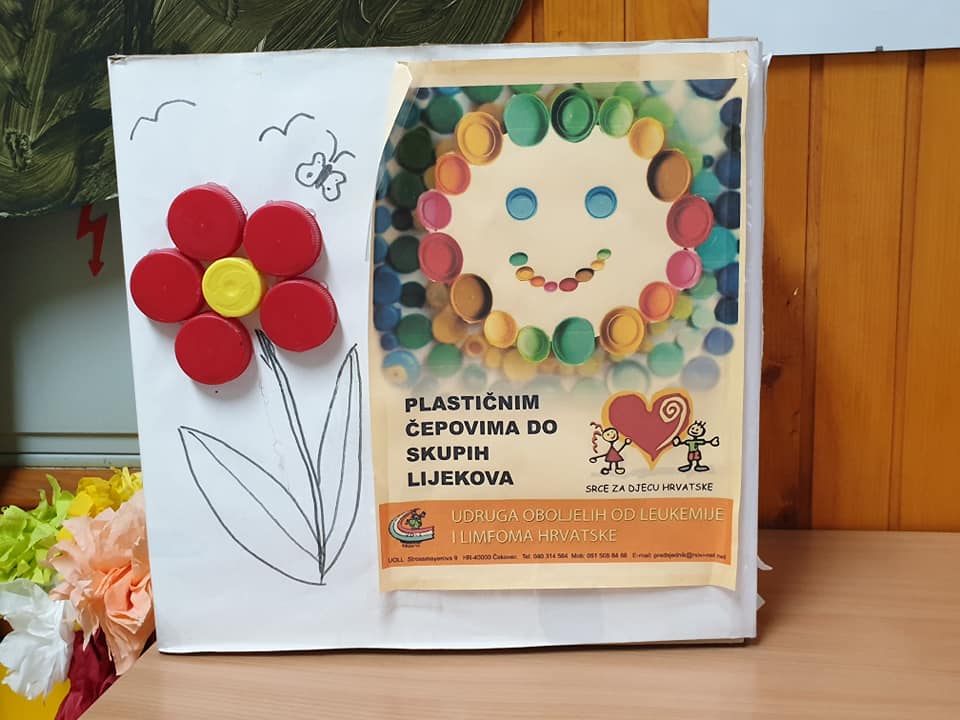
And you don't get to be an eco school for 17 years without the messages of recycling and the environment at every corner - creatively done of course.
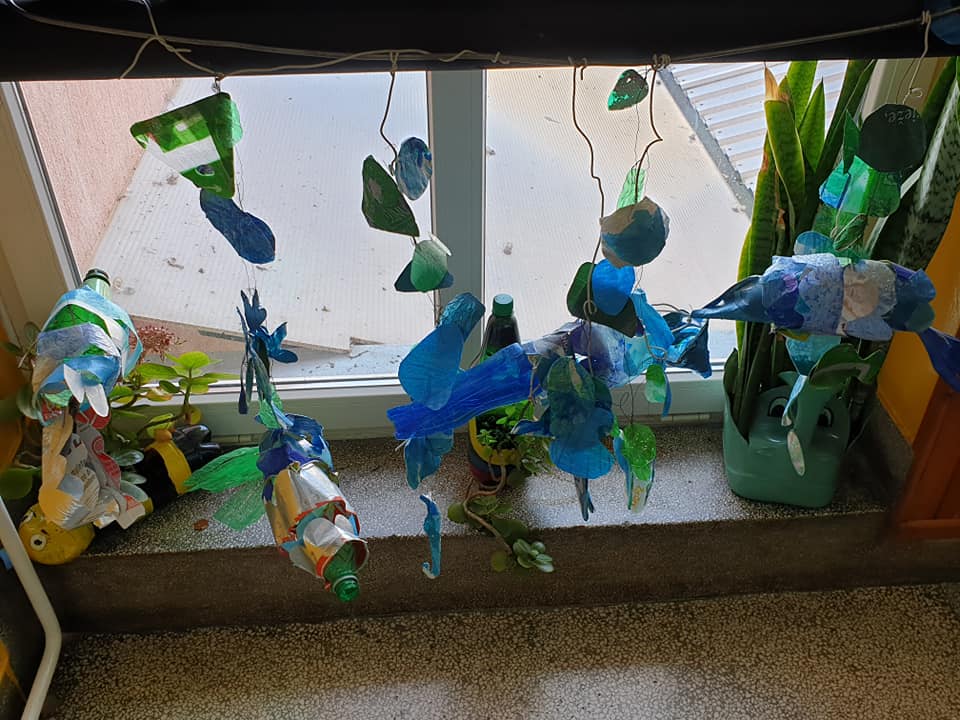
Everywhere... This was one highly creative school.
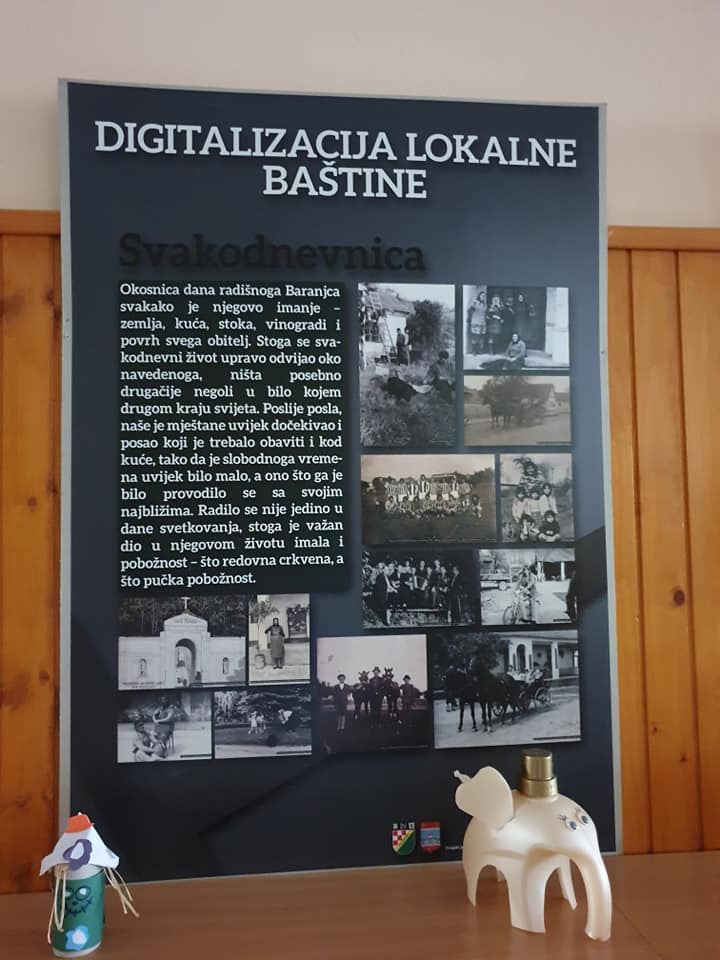
And one very much embracing the future and technology, despite being in such a perceived remote backwater. In some ways Baranja is actually quite accessible. As I noted in my 10 Things I Learned at Days of Croatian Tourism in Slavonia, Baranja is actually the closest point in Croatia to the most important international airport hub in the region - Budapest.
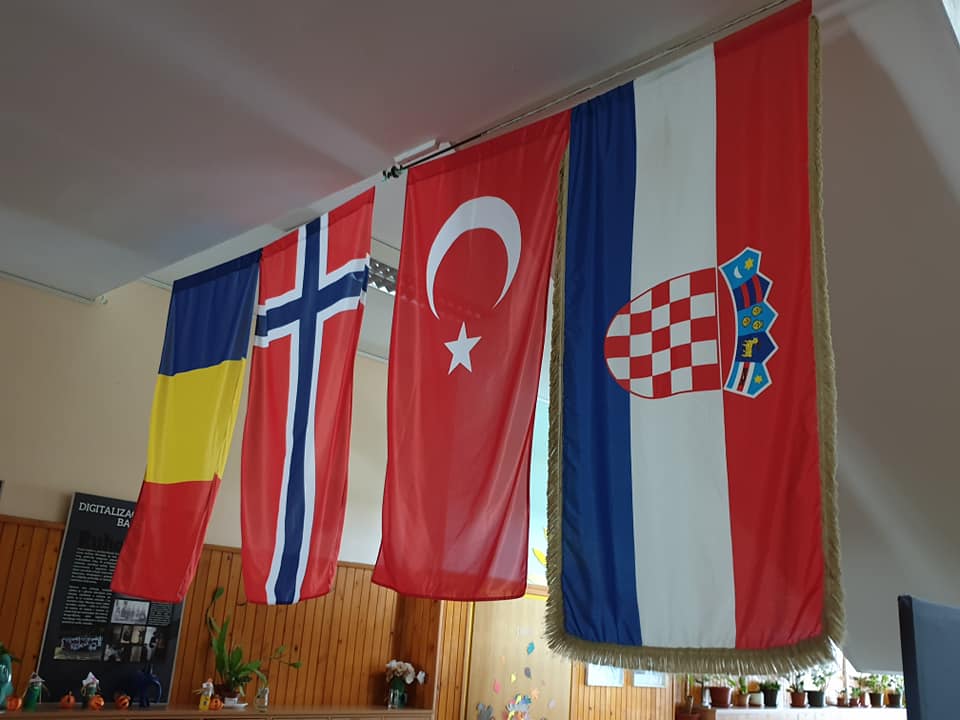
I was surprised to see the flags of Norway, Turkey and Romania hanging alongside the Croatian flag in the main school corridor, but I should not have been, for as Goran wrote for TCN, Popovac is very actively engaged in an Erasmus programme with schools from those countries in a project against plastic pollution. You can read Goran's account here.
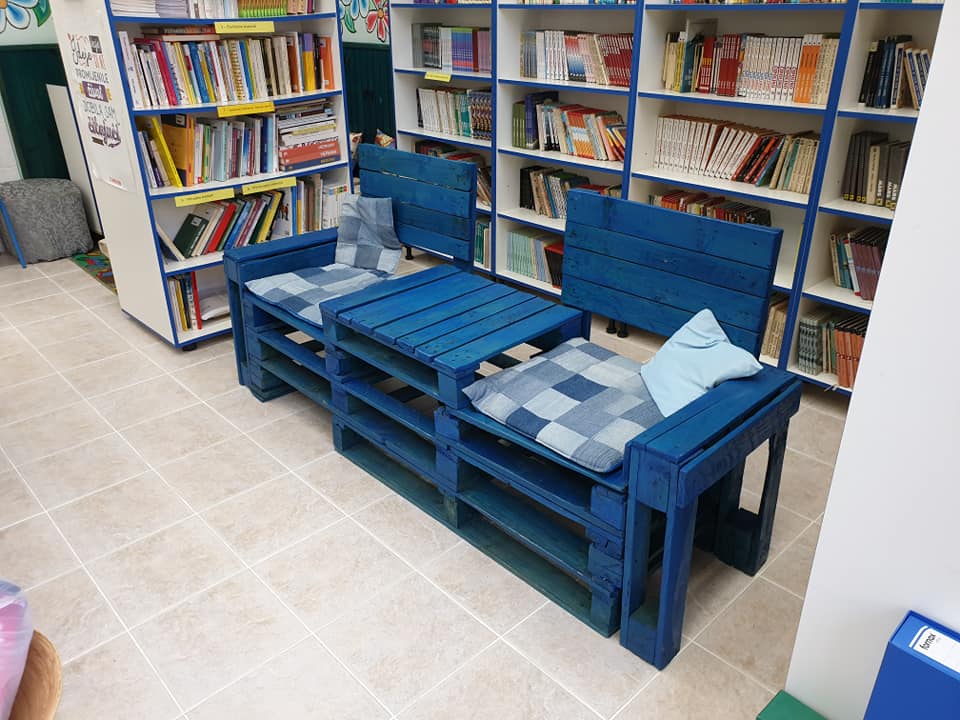
And just as you encountered the Popovac eco credentials, so too the creative side of life. With dedicated teachers like this, school must really be a joyful experience for these Popovac youngsters. The cushions on the chairs are made from old jeans of the kids.
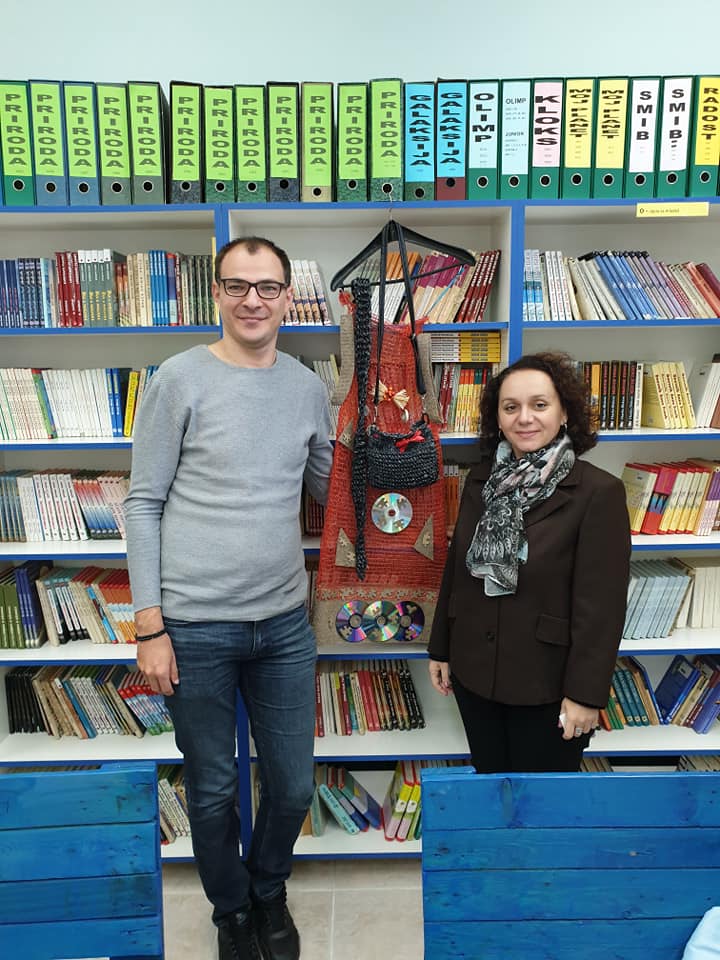
Two of the creative geniuses inspiring young Baranjan minds, in between a party frock made from recycled materials - Goran and creative and bubbly librarian, Marijana Kuna.
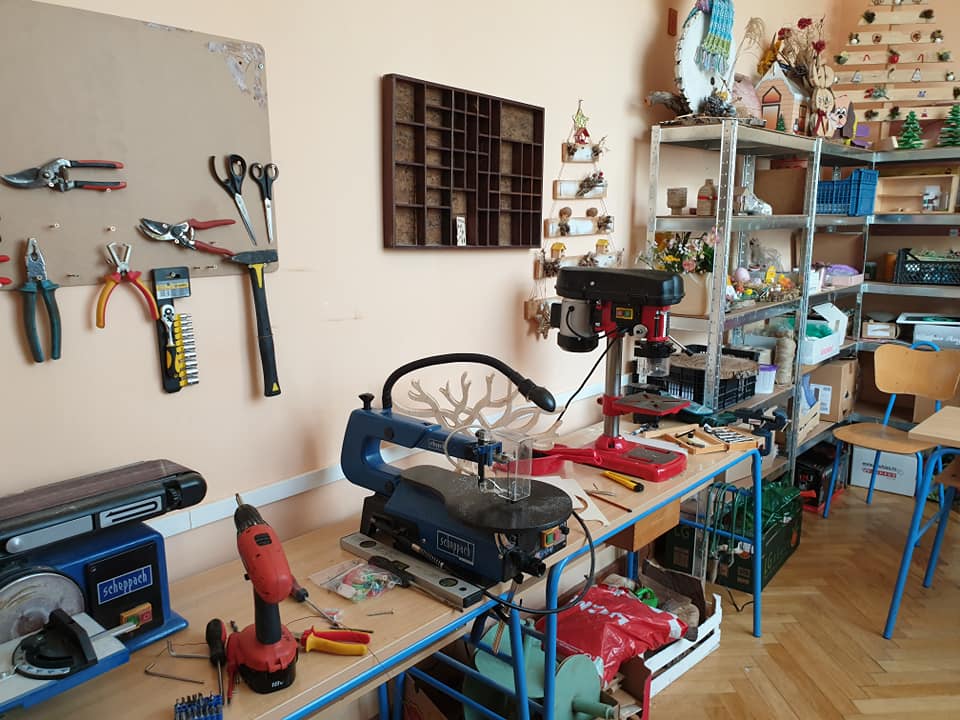
The workshop.
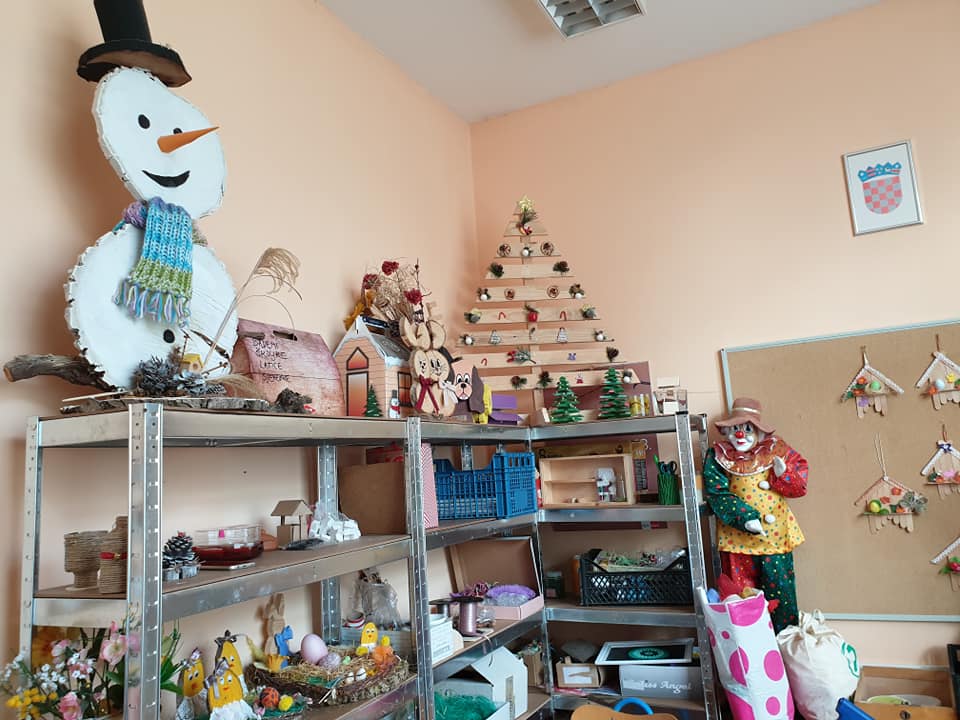
Christmas is coming. Time to turn recycled materials into decorations.
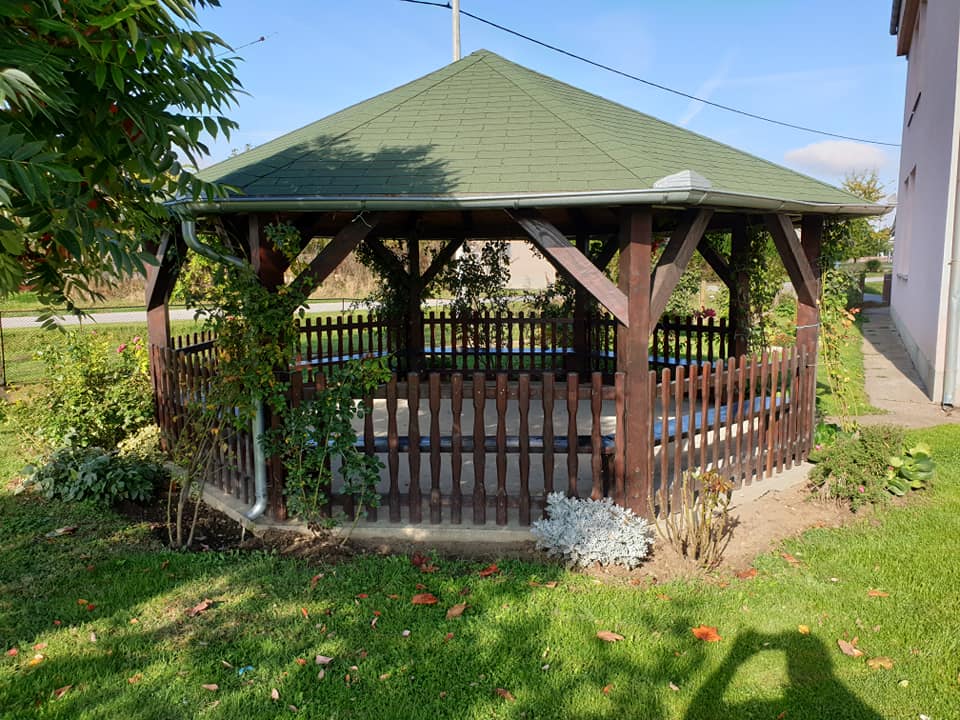
And when the sun shines brightly, as it did on my visit, take a break from the routine of the classroom and take the education to an outdoor classroom in nature.
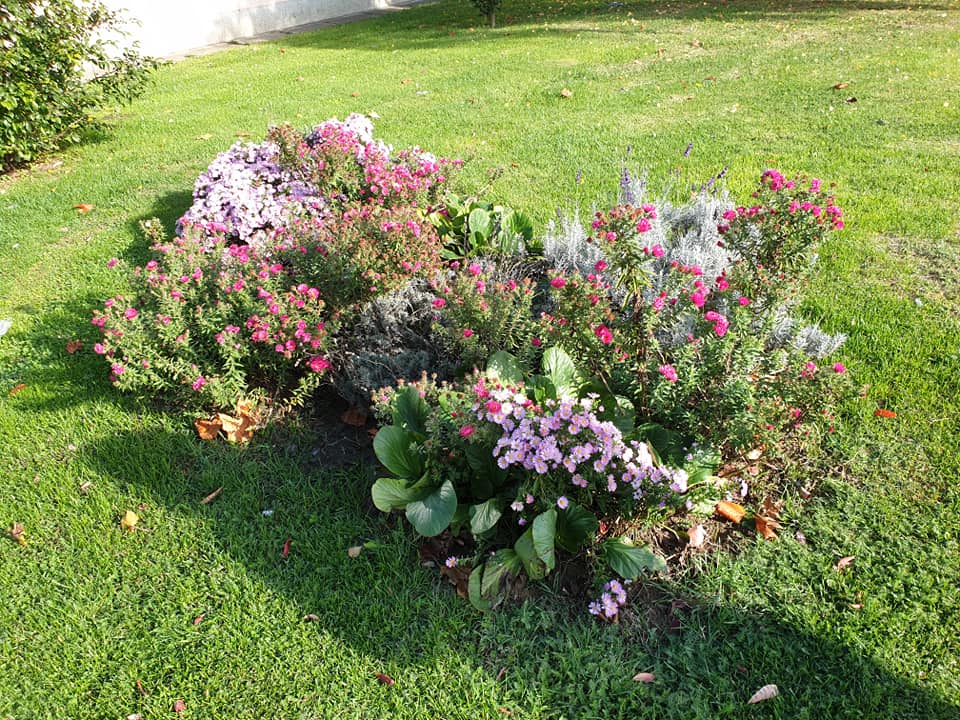
Surrounded by beautifully keep gardens.
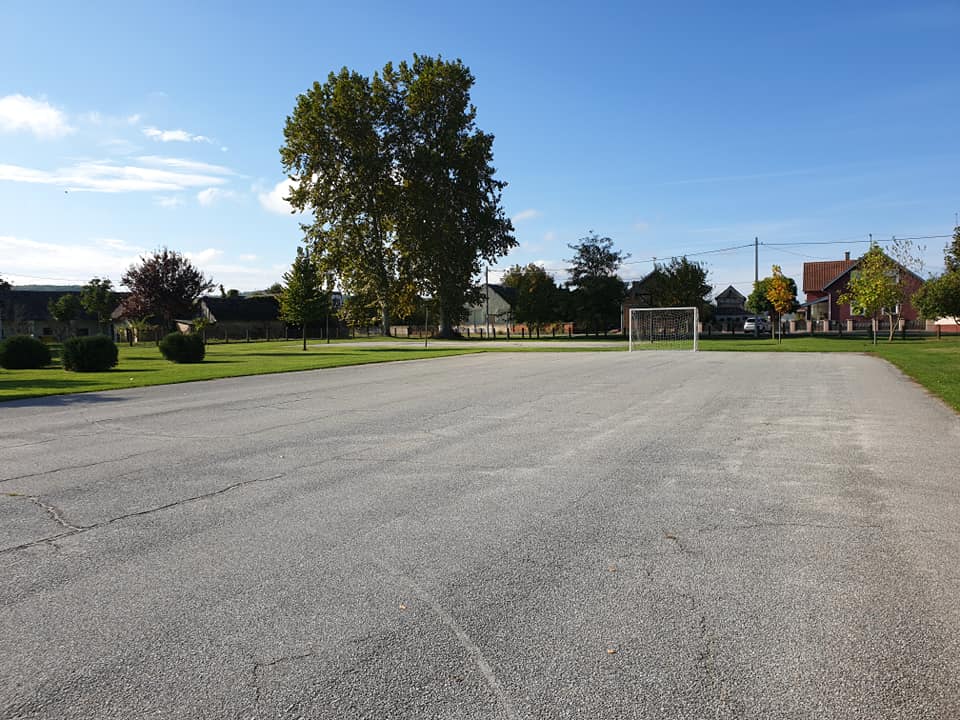
Ample space for physical exercise.
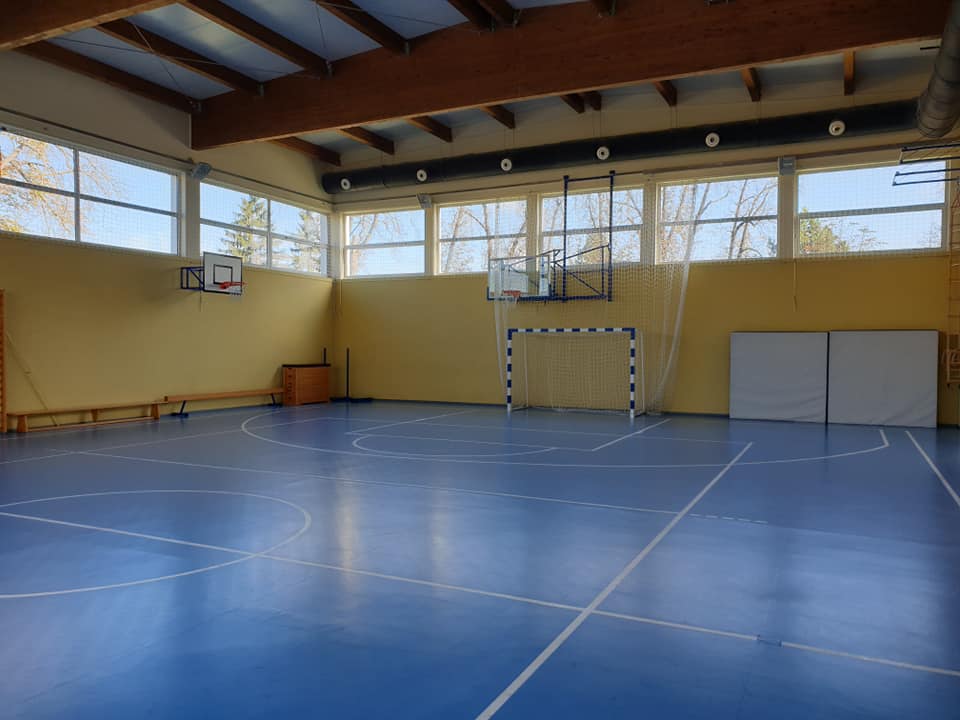
Both inside and out.
"You seem to have everything," I commented, really rather impressed and very much enjoying my visit despite the 05:45 start to the day so that I could fit Popovac into my busy schedule for the day. "Is there anything you are missing?"
"Just one thing. Kids."
The emigration from the east. The simple numbers tell it all. The 2011 census recorded a population of 2,500 people for Popovac and surrounding area. Unofficial estimates from officials put today's figure at about 1,100 just 8 years later.
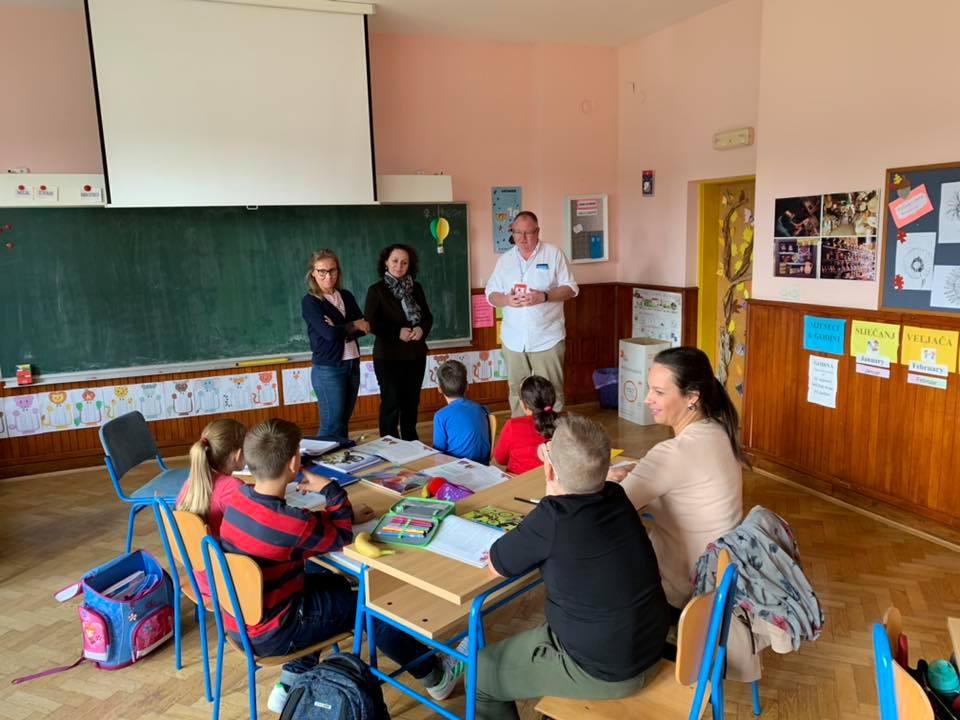
And while I am sure that the lack of employment and opportunities are worries for the parents, the kids are having an idyllic start to life, and there are clearly enjoying the creative environment of their special school. And they were very patient and welcoming when a fat Brit interrupted their classes last week.
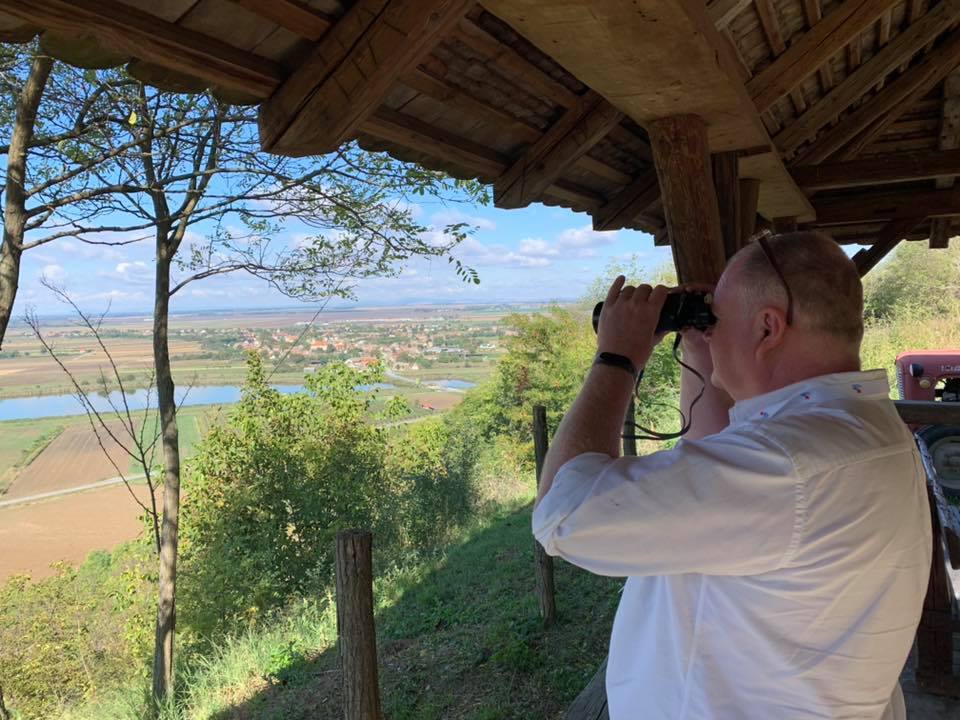
I had come to the east of Croatia knowing I would meet great people (it is impossible not to in Slavonia), but I thought I would come across a lot more despair. Quite the opposite was true. People here have got such a great attitude to life, the nature truly is unspoiled, and there is a great sense of community and a very safe environment.
As I took a tour of the area with Goran, Marijana and the deputy mayor to the highest point of Baranja (not that high!), I looked back over the flatlands of Baranja and Hungary beyond, and I wondered. Emptying today, but for how long?
As they said in the school, the only thing missing in this paradise is jobs which has led to people leaving. In many other aspects, it is a gorgeous place to live, especially for those looking to escape the rat race in exchange for a more natural way of life.
The digital revolution is coming, and it will come to Baranja as well in time. With one estimate of one billion people working remotely by 2035, I for one would not be surprised if a little creative thinking and investment might reverse the emigration and attract people to come and work remotely and raise their kids in this lovely, natural part fo the planet.
During my meeting with headmistress Jadranka, we talked about a couple of projects of collaboration between TCN and Popovac, of which more next year, but I was struck by her initial response to my enquiry.
"We sadly do not have money for projects, but lots of desire, goodwill and our time. We are open to all suggestions."
Perhaps you have a suggestion to establish ties with Popovac. You can follow the latest from Popovac School on Facebook.
To learn more about the magic of eastern Croatia, here are 25 things to know.
Baranjski Surduci – Ultimate Cyclo-Tourist Event
The dynamic Association of Baranja Recreational Cyclists organised on May 19th its first official event – the Baranjski Surduci cycling tour. The Lajmir lake near Beli Manastir was the starting point of this cyclo-tourist expedition.
The artificial lake was created in the early 20th century when it was excavated for the needs of the former Belje sugar factory, so it is understandable that its unofficial name is Sugar Lake. About twenty years ago, the sugar factory ceased its operations, so the lake has lost its original purpose. Several years ago, it was turned into a recreational and excursion area. A nearly four-kilometre-long cycling trail was built on the embankment along the Karašica river, which feeds the lake, with rest areas and a skate park.
For those who do not know, there are two Karašica rivers in Croatia. One is located in Slavonia, formed by the joining of the Vojlovica and Čađavica rivers, and enters the Drava river near Petrijevac, while the other is located in Baranja, starting at Pecsvarad in Hungary and flowing into the Danube near the Battle of Batina monument.
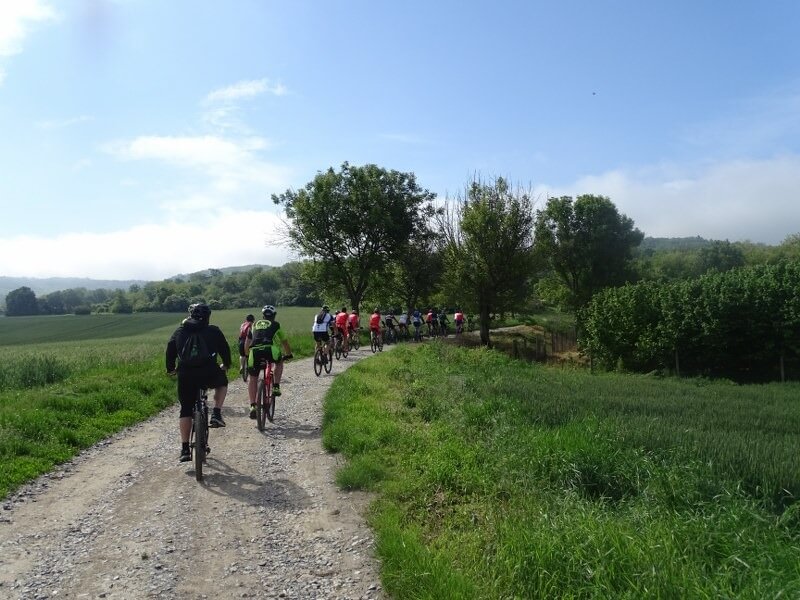
After receiving the starting packages that included a lunch voucher and a drink, a backpack, a t-shirt, a bidon, a pen and a notebook with the event logo (everything for just 60 kuna) and an obligatory group photograph, sixty brave bikers went towards Banovo Hill to get to know its natural beauties and attractions, especially the surduks.
Surduks are steep grooves on Banovo Hill, created by the descent of the rainwater from the hill. Surduks on Banovo Hill can be a few metres tall because the roots of trees on the sides prevent their collapse. When the crowns of these trees join, you are left with the impression of being in a tunnel.
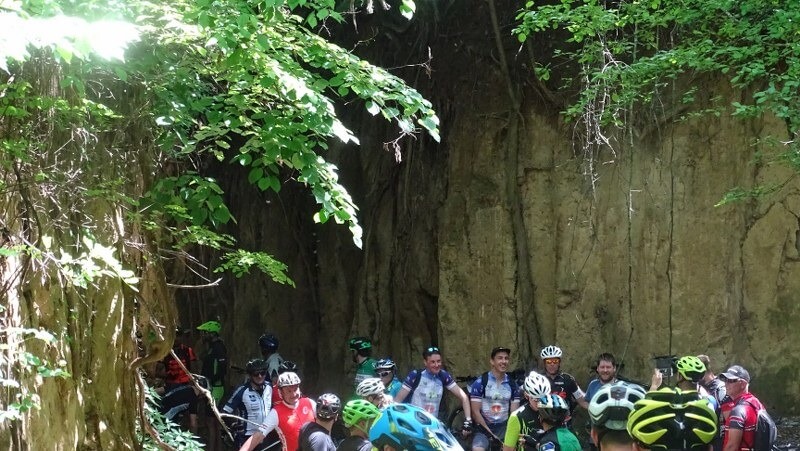
The originator of the event is Zoran Kovač from Beli Manastir, who knows surduks like his pocket, so much so that he can cycle through them in complete darkness. It is fortunate that Zoran did not keep his knowledge of surduks just for himself, but has decided to share it with others.
I thought I knew Banovo Hill well, but when I started cycling with Zoran my self-confidence when it comes to the knowledge about this Baranja hill collapsed in a very short time. Still, live and learn, and you should always spend time with people who know more than you do.
After a short ride on a bicycle trail which served to warm us up, cyclists went to Branjin Vrh, a suburb of Beli Manastir, and then towards the Baranja hill. Initially, the Hungarian name of Branjin Vrh was Baranyavar, and once this was the centre of the entire historic Baranja County. The part of Baranja which is now in Croatia is just a small part of the former Hungarian Baranja County (Baranya Varmegye), which Hungarians also call the Drava Triangle. The seat of today's Hungarian Baranja County is located in Pecs, and it stretches to the north as far as the village of Mekenyes, which is about sixty kilometres from Pecs.
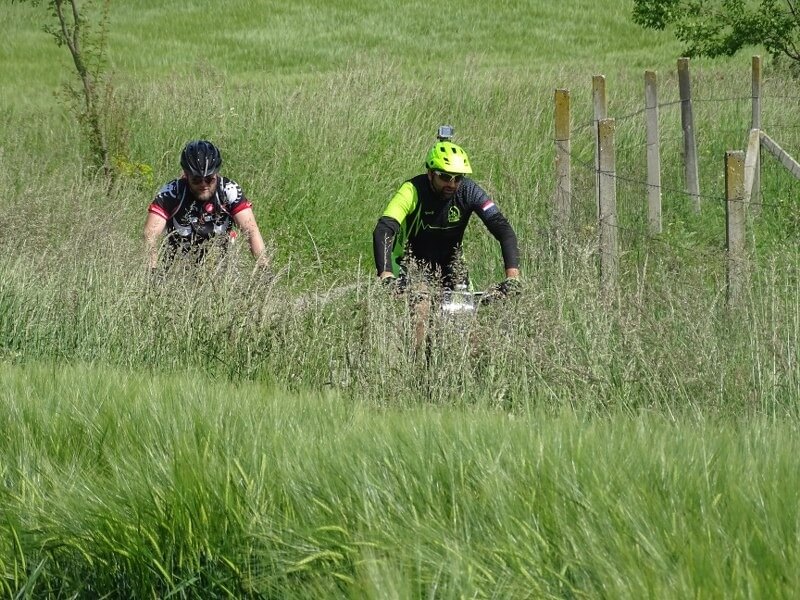
On a trail at the end of Branjin Vrh, the cyclist stopped at the cross to once again count ourselves and provide final instructions. Some prayed for good luck. The first rest point was at Popovac, at the shrine of Our Land of Lourdes, located on the other side of the hill.
In the initial phase, we partly used the multifunctional trails of the town of Beli Manastir. It is a tourist product which uses the part of Banovo Hill located within the administrative boundaries of the town of Beli Manastir as a destination for the recreation of locals and tourists. At about 50 locations on the trail, signposts have been set up, and there is also a mobile walk&bike app that contains a map of the hill, showing your location, and can be used offline.
After that, we went to the Belje wine road stretching from the Beli Manastir to the new Belje winery in Kamenac. It is asphalted and suitable for tourist buses. The central part of the wine road includes a viewpoint with a beautiful view of vast vineyards on surrounding rolling hills. We did not stay for too long on the asphalt. We turned right and rode on the grass along the edge of the vineyards, then turning into a damp, dark and muddy surduk.
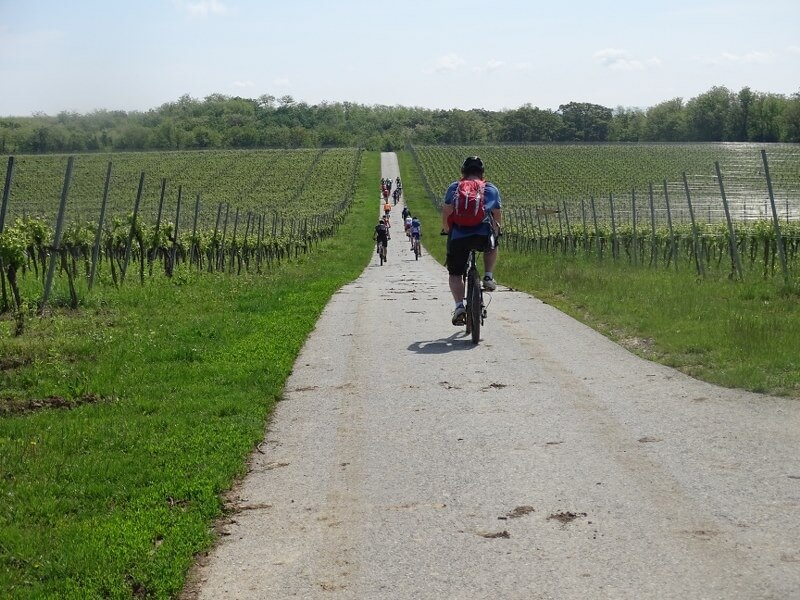
It was raining in Slavonia and Baranja for nearly the entire week ahead of the event, so many surduks were muddy, wet, especially those in the form of a tunnel, where the surrounding vegetation did not allow the sun rays to penetrate. In some places, the trail turned into a bog, so we had to ride on the thick grass next to it.
We were hoping for better terrain after leaving the surduks, but it was quite the opposite; we came across substantial muddy puddles that forced all participants to stop and lift the bicycles on their shoulders. While descending towards Popovac, we enjoyed a fantastic view of the hills in the neighbouring Hungarian Baranja, Villany-Hegyseg and its highest part called Szarsomlyo.
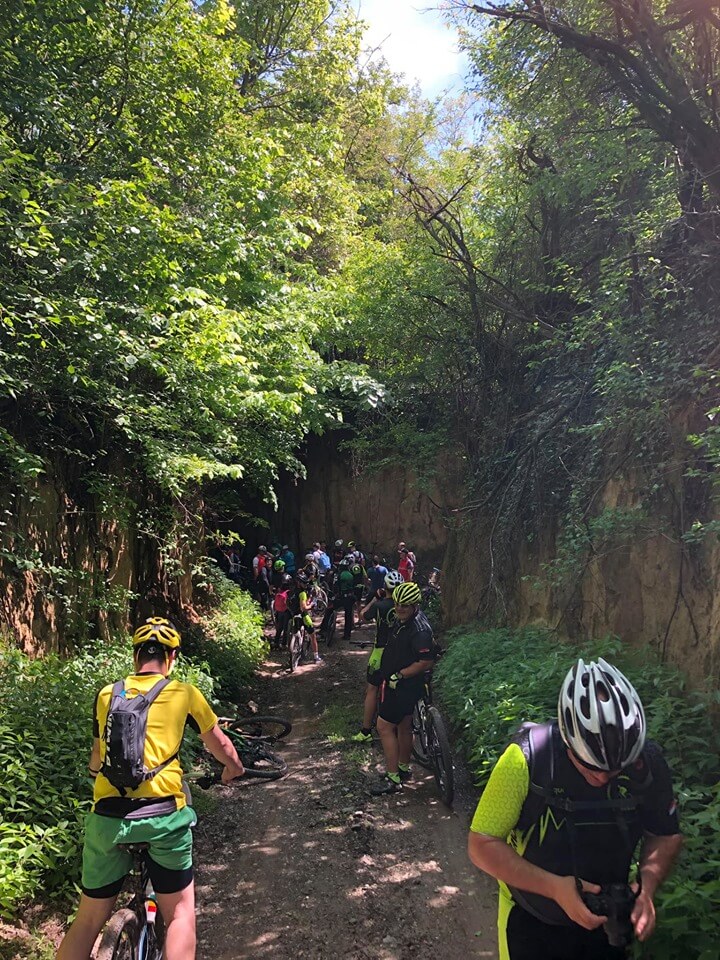
A well-deserved rest in Popovac, with water, juices, bananas, cakes, crescent rolls, and local cured meat delicacies. Although it was Sunday, the mayor of Popovac municipality Zoran Kontak came to wish us luck. The original Hungarian name of Popovac is Ban, hence Banovo Hill. It received the name Popovac for its priests (pop) about a hundred years ago, after the peace treaty signed at the French castle of Trianon and the division of a once united county into the Hungarian and Croatian parts, because it is a seat of two parishes, a Catholic and an Orthodox one.
The first name of Banovo Hill was Mons Aureus, which in Latin means the golden hill. After the Eugen of Savoy expelled the Ottomans from Pannonia and Baranja joined the Habsburg Empire, the new masters called it Goldberg, which in German also means the golden hill. Goldberg is today the name for the best wine-growing site on the whole hill, with the best microclimate conditions and composition of the soil, located just above Popovac. Goldberg is also the name of the premium line of Belje wines.
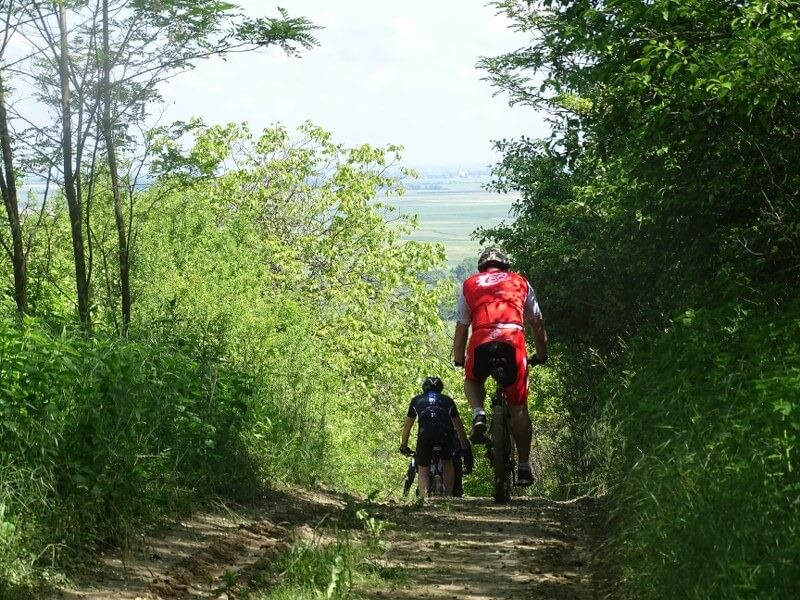
While we rested, we could see the transmitter, which was our next destination. The path to the transmitter allowed the participants to take a shorter ride on a trail that was either flat or sloping down. However, the relaxation did not last for too long, because before the transmitter it was necessary to climb again. After a short stop at the facility called Belje Villa at the foot of the transmitter, waiting to all the participants to gather, we continued the odyssey and hit the concrete path leading to the new Belje winery in Kamenac, but then turned sharply to the left and after an impressive ride ended up at the very tip of the Baranja hill, which is called Kamenjak. After that, we continued through the vast vineyards which were later replaced by meadows. After another glorious descent where we all kept nervously pressing our brakes (smell of burnt rubber could be felt), we found ourselves again in the plains, in Podolje.
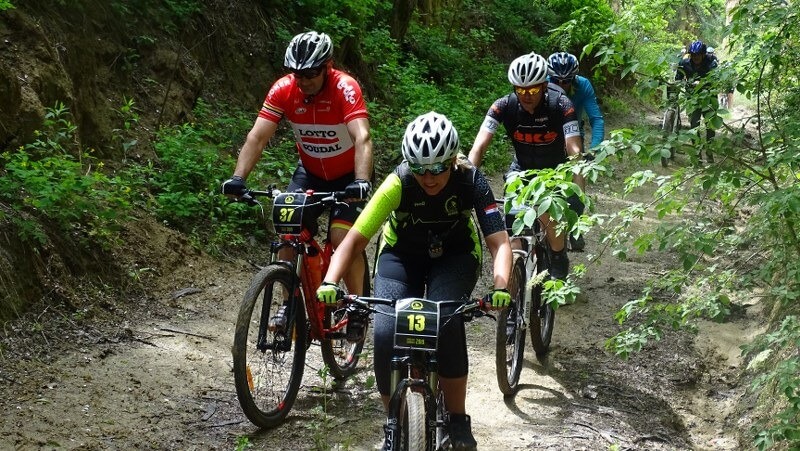
After a short rest on the asphalt road, we turned left following brown signage saying “Banska Kosa Wine Road”, and continued as before: climbing, avoiding the mud, meadows, vineyards ... Then we stopped in a gigantic surduk so that we could all gather, refresh, and immortalise the moment with a photo. This was a culmination of the bike ride. All the surduks we passed through were "dwarves" compared to this one. Many participants could not imagine that something like that even existed in Baranja until they came and saw it for themselves.
After a half-circle along the surduk, we were again on the same asphalted road, and a large herd of lambs passed us on to the left. There are three theories about how the name Baranja came about, one Slavic and two Hungarian. The first is that it comes from the word “barany”, which means lamb in Hungarian, the second is that it comes from “boranya”, which in Hungarian means the wine mother. After the vast vineyards, we finally saw the lambs, which provided us with at least one "proof" in favour of the second Hungarian theory. Slavic theory suggests that the name Baranja comes from the word “bara” (bog). Even though we were far from Kopački Rit, we saw more than enough bogs. Despite all this, I am somehow more prone to believe that Baranja is first and foremost the wine mother.
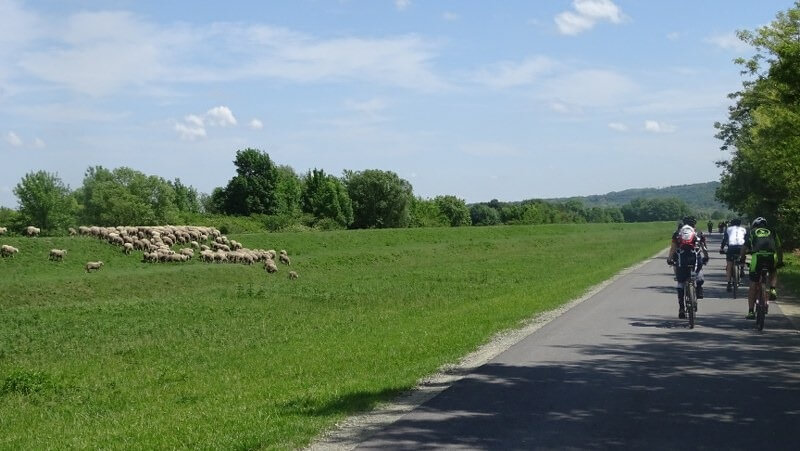
Even more surduks followed with vineyards and trails... The transmitter, as a landmark, was now on the opposite side than when we were watching it during the rest stop in Popovac. After the downhill ride, we found ourselves on the Kotlina-Podolje road, the first asphalt road that crossed Banovo Hill and the only place you have to touch the asphalt if you want to pass Banovo Hill on unpaved trails. One group went towards Kotlina on a more comfortable, asphalted road, while the second group continued on the trails, through more surduks and through the muddy loess. Where it was not wet, the ground was brittle, with clumps crushing into the dust under our tires. In Kotlina, near the pond, there was the second and final rest stop. Similarly as in Popovac, we were treated to water, a few dried fruits, banana, cookies, a piece of cheese, sausage, bacon and we were ready for new surduks.
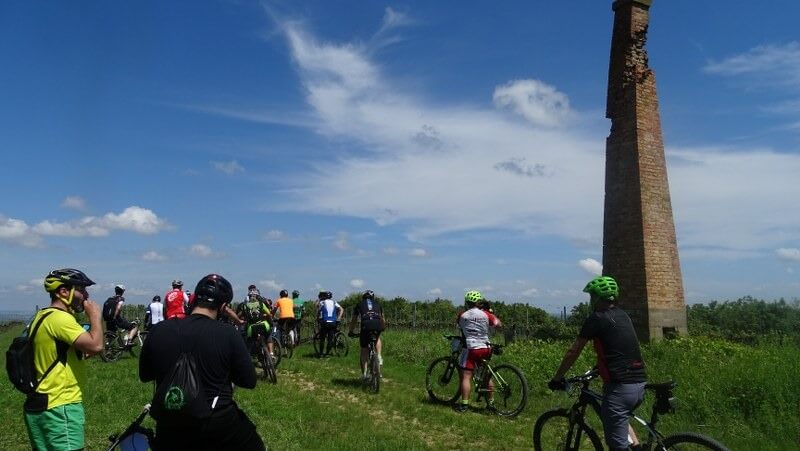
After a long and relaxing ride at the foothills, we used the last atoms of our strength to climb to the ridge of the hill, and we were rewarded with an asphalted Belje road on which we were several hours before. Driving through the winding and rolling vineyards, we came to the Belje viewpoint and continued after a short break. The culmination of this road section of the event was the crazy and unforgettable downhill ride on the Garmisch, as this part of Banovo Hill is often called.
At the beginning of the ride, I managed to get a puncture, which I realised while pushing the bicycle through a surduk. With the aid of tire sealant, I managed to solve the problem, but after two to three hours, I realized that it did not have a permanent effect, so the tire was again losing air. While descending the Garmisch, the tire was almost entirely flat, and the ride became risky. The left or right turn could get me out of balance. Did it make sense to give up at the very end, on the asphalt road?
We reached a new bike path connecting Beli Manastir with the Belje vineyards and bumped into a bicycle service station. The worker there pumped my tire (thanks, Krunoslav!) enough to be able to ride the final two or three kilometres. No surrender, let's go. We did not return to the Lajmir lake by the standard route; we entered the town, and before the underpass that leads from Beli Manastir towards Belišće we turned right and went straight to the lake where the rest of the team, which decided to shorten the bicycle route, was already waiting for us.
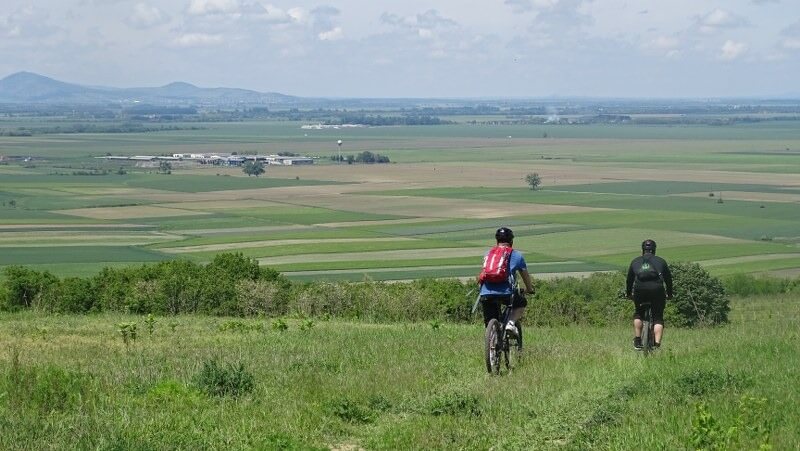
Then we were overwhelmed by a weird mixture of euphoria and fatigue, pride and exhaustion, the luck that we reached the end and the sorrow that we have left the enchanting world of the Baranja hill and its surduks and came back to the everyday life, its routine and monotony. But there will be more surduks, and this was just the beginning. We were particularly delighted by the comments of those who had been there for the first time, who said that this was fantastic and that they would visit the surduks in the future outside of organized events as well. That is the goal of this kind of events.
The Baranjski Surduci was an international event, bringing a group of cyclists from Sombor led by Robert Marton, the president of the Sombor Cycling Club, known to many cyclists as Gianni. We should also mention the oldest participant, Josip Mendelski Joka, a member of B.U.D.A. (the Donji Andrijevci Bicycle Association), who is seventy-one years old and who shamed many of much younger participants at the steepest climbs. The event also included members of the Baraber Extreme Team sports club from Belišće, the BizBike association from Bizovac, Road Team from Donji Miholjac, Kotrljaneri, Weekend Warriors and Osijek cycling club from Osijek, as well as many other unaffiliated riders.
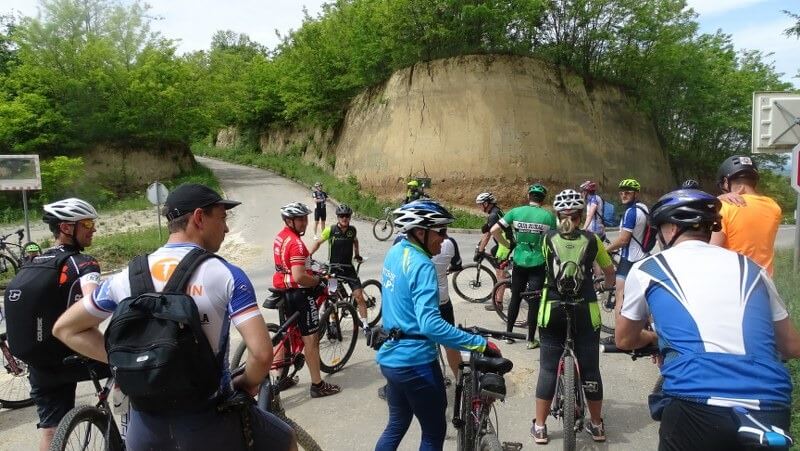
At the finish, we were welcomed by an excellent beans dish, and I do not say this just because I was starving, which is unsurprising after all the efforts made. Beans is a really interesting dish since it is more delicious if it is prepared for more people. Although this event was not a race, all participants had start numbers on bicycles. Why? We learned this only when we returned. There was a raffle organised, and fifteen lucky ones received prizes.
We should commend the association president Tanja Šoš on the organisational efforts, Zoran Kovač on the idea and leadership, and Krunoslav Perković, who took care that no one was left behind or got lost in the wilderness of the only hill in Baranja. Of course, we must not forget the volunteers from the Red Cross Society of Beli Manastir and the Oaza Peace Group NGO, and all those cyclists who enjoyed the gentle spring breeze on the paths offering fantastic views, drifted on steep and muddy surduks, cruised through endless vineyards, pushed their bicycles when the gravity did not allow them to proceed in a different manner...
Cramps and the consequent muscle inflammation, a few punctured tires, a few falls (with no serious injuries), and a bicycle failure here and there are entirely unimportant compared to all the beautiful things the participants have experienced on this event and all the memories they took with them. Or, how mountaineers and other outdoor fans love to say, "Tiredness passes, satisfaction remains”.
More cycling news can be found in the Lifestyle section.
Vukovar's Hotel Dunav Sold, New 200 Million Kuna Hotel to be Constructed
As Poslovni Dnevnik writes on the 4th of May, 2019, Vukovar Mayor Ivan Penava and the CEO of the Swiss company Immo Invest Partner, Džek Djordić, signed a contract on the sale of the Dunav (Danube) Hotel in Vukovar on Saturday, and the Swiss company has thus announced the construction of a new four-star hotel, in which it will invest a massive 200 million kuna.
"This is a strategically important property in Vukovar, the building of the former Dunav Hotel, which has attracted a lot of interest from the public," stated Penava, pointing out that the building is located in an extremely valuable location at the very mouth of the Vuka along the Danube, but also because it involves a building that has not been in function for nine years now.
He added that the city, owing to the fact that the hotel had remained totally out of use for a long time, bought the former Hotel Dunav in order to sell it to a hotel business that had already established its branch office in Vukovar. The city will do everything to make the investor feel welcome with their investment which is strategic and considered to be at the state-level.
Deputy Mayor Marijan Pavliček recalled that the City of Vukovar had purchased Hotel Dunav for 10.3 million kuna, while a price of 10.7 million kuna was asked for at the public tender, and the aforementioned Swiss company offered 11.3 million kuna and paid the difference in accordance to the higher requested price.
"The investors are obliged to collect all of the necessary permits in the next eighteen months after which the parcel will be handed over to their ownership, after which a seven-year legal deadline for the construction and commissioning of the facility comes into force," Pavliček said, adding that the investors have promised a significantly shorter implementation deadline, more specifically until the year 2023.
Pavliček emphasised the fact that this is the biggest investment after the Homeland War in the tourist sector of Vukovar, which will open up welcome new jobs.
Immo Invest Partner's CEO Džek Djordić announced the construction of a four-star hotel with about 120 rooms, 240 beds, and which will include several restaurants, offices and a multimedia space in which about 200 million kuna will be invested, and the hotel should be open in 2023.
Immo Invest Partner Board Member Petar Đorđić thanked the mayor and his deputy for their engagement in the realisation of this deal and said that all those involved are great optimists and that the entire investment will be realised within the anticipated deadline.
Make sure to follow our dedicated business and lifestyle pages for much more.
Croatian Startup and Entrepreneurship Discussion in Koprivnica
''The most important thing is to have a clear plan and a vision and to be persistent and never give up, because every good idea will find its way to a buyer,'' this was the message sent out to those thinking of becoming Croatian entrepreneurs.
As Ivan Tominac/Poslovni Dnevnik writes on the 18th of April, 2019, an event organised by Vecernji list and Poslovni dnevnik has the ultimate goal of which is the retention of young educated people in Croatia, and after Osijek, the event will move to Koprivnica, two continental Croatian regions which are often overlooked.
The event will include a tender for student development projects, round tables and forums entitled ''Future in Croatia'' which will be held across six Croatian cities in cooperation with six universities and a traveling exhibition to mark the the occasion of the 60th anniversary of Večernji list. In Koprivnica, the event will be held in cooperation with the North University on Tuesday at 10:00. Croatia's Minister of Tourism Gari Cappelli will give his view of Croatia and available opportunities, and before that, the event will be bringing two stories from Koprivnica that prove that you definitely can succeed in Croatia.
Boris Poljak, the owner of the Pobis company, noted at the very beginning of the conversation that entrepreneurship is not easy but challenging as the market does indeed offer countless possibilities, but whether or not we're successful is down to nobody and nothing but us.
"Being an entrepreneur depends on the person, and not on the place he's in. If one has the will and the desire to be an entrepreneur, then he won't care whether he's doing it in Croatia, Austria, Germany, or elsewhere," Boris Poljak said. For success, it's important to abide by the established plan and rules of the game, ie, certain legal frameworks.
According to him, young people aren't going straight into business today, but instead, they're moving into ''entrepreneurial waters'' because they want to ensure a secure existence for themselves. "The statistics on the opening and the closing of companies is proof of this. Unfortunately, many people don't succeed, but there are many who do succeed and who achieve excellent results here, and more and more are doing so internationally. Running your own business today doesn't require that much capital," Poljak stated with a short and clear message that says that without a clear plan and vision there can be no success.
"You have to work really hard with young people, they're most often not prepared for work and have a lot of prejudices towards employers," emphasised Poljak, adding that in his company he recognised that with the effort and investment poured into young people, he was creating quality staff who could compete on the world market level. Young people are increasingly involved in entrepreneurial ventures, and as a result, there are numerous startups popping up all the time across Croatia, leading to more tenders and investments.
Codebox managed to stumble upon such a welcome fat, the core activity of this organisation is the creation of personalised software, web design, computer equipment maintenance, and processing and data transfer. Martin Kolarić and Filip Stojić began on this path through a startup tender, and today they can safely say that it was a great opportunity to gain new experiences, try out their knowledge and skills and also have some fun.
"For all those who want to be successful, our advice is to work on themselves and their knowledge. A great deal of information is available to all of us and we have the opportunity of continuous learning and training. Innovation and creativity are the most important competencies today, which is why we need to work on our own improvement, this is the only path to real success,'' concluded Martin Kolarić.
Make sure to follow our dedicated business page for much more.
Click here for the original article by Ivan Tominac for Poslovni Dnevnik
Spring Fair Held in Karanac, Smokehouse Princess Selected
Karanac is a village located between Beli Manastir and Kneževi Vinogradi, on the southern edge of the wine-growing Banov Brdo hill. North of Karanac there are vineyards, with endless Baranja fields to the south. This is the first village in Baranja that has been branded as an ethno-village, and for a good reason.
In Karanac, there is the Baranjska Kuća ethno-restaurant, which also includes the Street of Lost Time, then family farms Sklepić, Tri Mudraca, Bakine Čarolije, Kukuriku, Ivica i Marica, Villa Baranya...
Just like Zmajevac is the wine capital of Baranja, Karanac is the centre of rural tourism and represents Baranja with all its ethnocultural group. It is a village with as many as three churches: Catholic, Orthodox and Protestant.
For a tourist destination to live a full life and attract new (and old) visitors, it is necessary to have well-conceived and well-managed events, and there are plenty of them in Karanac. Most have been initiated by the owner of Baranjska Kuća Vladimir Škrobo Bajo, and one of the most successful is the Spring Fair, held annually on Palm Sunday, the first day of the Catholic Holy Week.
Bad weather failed to spoil this year's fair. It was raining for several consecutive days, and therefore the whole Karanac was muddy and drizzly. Despite this, the festival brought together a large number of exhibitors, primarily family farms from Baranja (and Slavonia). It also included the competition for the Smokehouse Princess – the biggest, the heaviest and the most beautiful bacon.
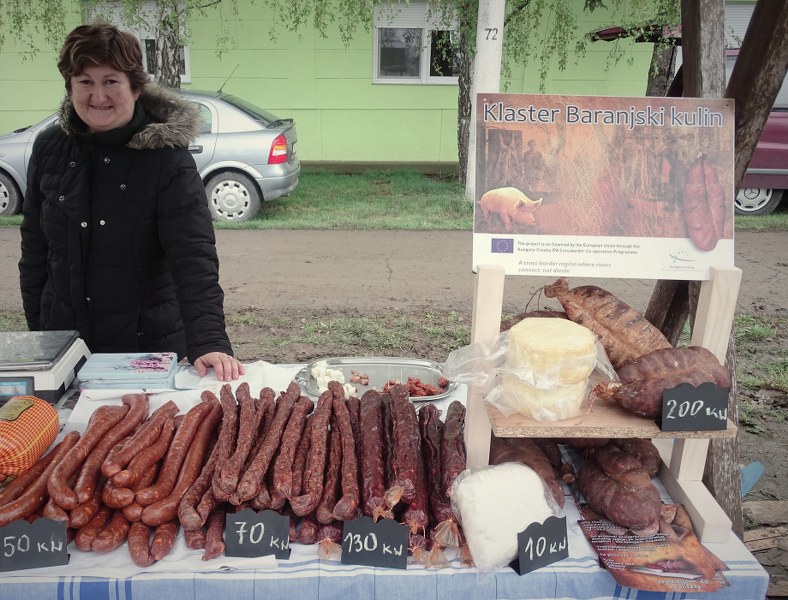
Among the exhibitors, we must mention Petar Dobrovac, or as everybody calls him “Čika Pero” from Kneževi Vinogradi. He is one of the foremost Baranja producers of kulen, as well as homemade ham, sausages, bacon and greaves. In this category of exhibitors, we should also mention the Kraljik family farm from Belišće whose owner, Hrvoje Kraljik, won several times at the Graves Festival, which is also held in Karanac.
Also present were Andrija and Ljubica Bošnjak from Branjin Vrh, with their aphrodisiac speciality: ajvar with okra. They are also known for their plum jam and wine jelly.
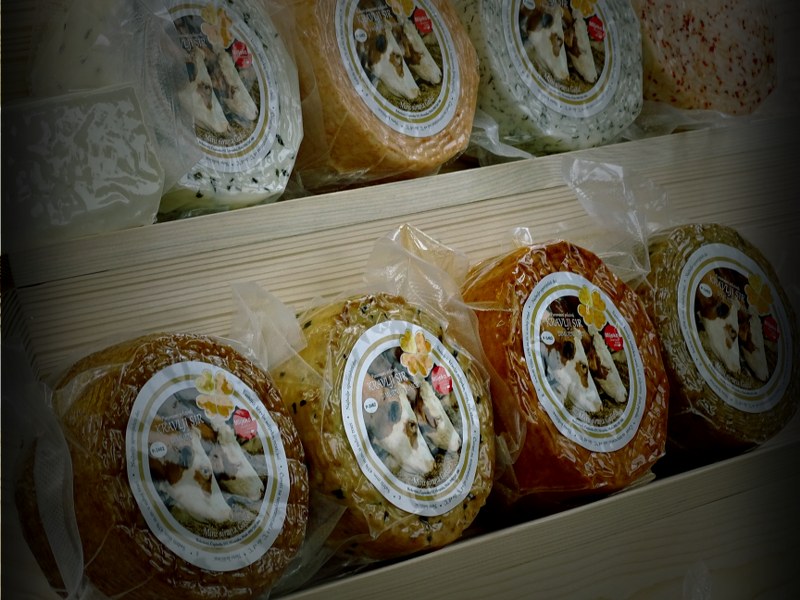
The Gašić mini-dairy from Beketinci near Đakovo presented its fantastic cheeses. They specialise in the production of cooked and smoked cheeses from cow milk. Another dairy producer who took part in the event was the Đurković family farm from Marjančaci near Valpovo, which makes fine goat cheeses.
As for minced red peppers, we must mention the Major family farm from Kotlina, whose stemless peppers are hand-picked and the final product is made according to the traditional recipe. The women’s association “Sretne i Spremne” from Jagodnjak presented its delicacies. They are also known for organising a great gastronomic event, Baranjska Už’na.
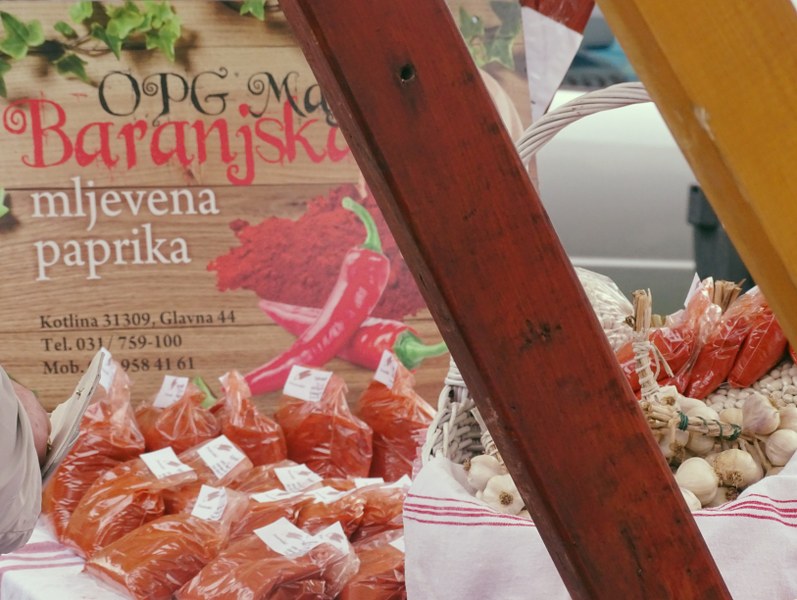
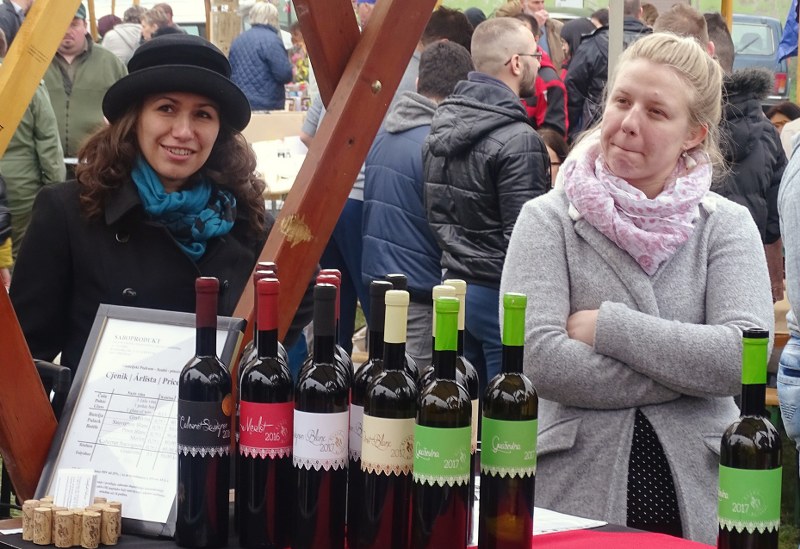
Of course, good food is always accompanied by good wine. The Spring Fair featured wineries Szabo and Svijetli Dvori, both from Karanac.
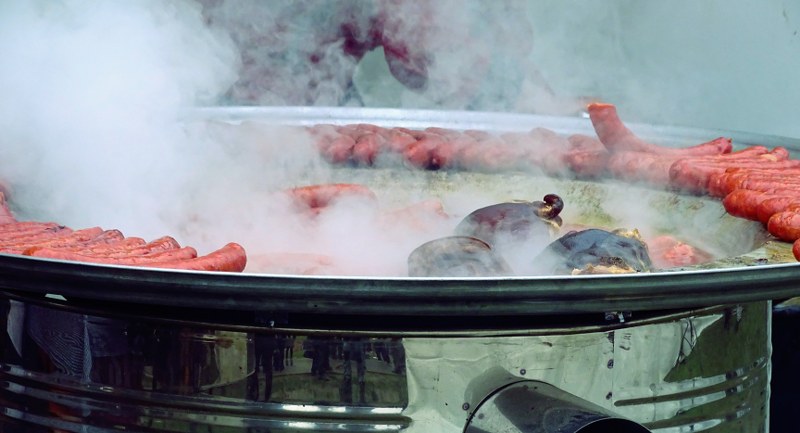
The whole village was full of homemade cakes, grave scones, langošicas, and visitors could also try beans in a jug, and a special Pannonian delicacy – carp on a fork.
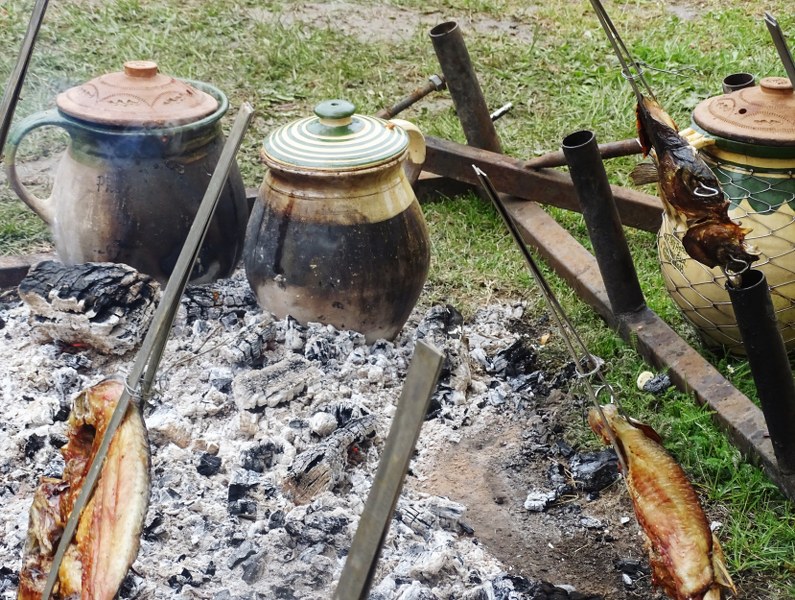
This year, the winner of the Smokehouse Princess competition was the “5 Kumova" team from Valpovo, led by Tomislav Blažević-Bisko. Their bacon weighed 196 kilograms. The second place went to a piece of bacon weighing 166 kilograms, while the third one weighted just 82 kilograms.
More Baranja news can be found in the Lifestyle section.


